External electrical and pharmacological cardioversion for atrial fibrillation, atrial flutter or atrial tachycardias: a network meta-analysis
- PMID: 38828867
- PMCID: PMC11145740
- DOI: 10.1002/14651858.CD013255.pub2
External electrical and pharmacological cardioversion for atrial fibrillation, atrial flutter or atrial tachycardias: a network meta-analysis
Abstract
Background: Atrial fibrillation (AF) is the most frequent sustained arrhythmia. Cardioversion is a rhythm control strategy to restore normal/sinus rhythm, and can be achieved through drugs (pharmacological) or a synchronised electric shock (electrical cardioversion).
Objectives: To assess the efficacy and safety of pharmacological and electrical cardioversion for atrial fibrillation (AF), atrial flutter and atrial tachycardias.
Search methods: We searched CENTRAL, MEDLINE, Embase, Conference Proceedings Citation Index-Science (CPCI-S) and three trials registers (ClinicalTrials.gov, WHO ICTRP and ISRCTN) on 14 February 2023.
Selection criteria: We included randomised controlled trials (RCTs) at the individual patient level. Patient populations were aged ≥ 18 years with AF of any type and duration, atrial flutter or other sustained related atrial arrhythmias, not occurring as a result of reversible causes.
Data collection and analysis: We used standard Cochrane methodology to collect data and performed a network meta-analysis using the standard frequentist graph-theoretical approach using the netmeta package in R. We used GRADE to assess the quality of the evidence which we presented in our summary of findings with a judgement on certainty. We calculated differences using risk ratios (RR) and 95% confidence intervals (CI) as well as ranking treatments using a P value. We assessed clinical and statistical heterogeneity and split the networks for the primary outcome and acute procedural success, due to concerns about violating the transitivity assumption.
Main results: We included 112 RCTs (139 records), from which we pooled data from 15,968 patients. The average age ranged from 47 to 72 years and the proportion of male patients ranged from 38% to 92%. Seventy-nine trials were considered to be at high risk of bias for at least one domain, 32 had no high risk of bias domains, but had at least one domain classified as uncertain risk, and one study was considered at low risk for all domains. For paroxysmal AF (35 trials), when compared to placebo, anteroapical (AA)/anteroposterior (AP) biphasic truncated exponential waveform (BTE) cardioversion (RR: 2.42; 95% CI 1.65 to 3.56), quinidine (RR: 2.23; 95% CI 1.49 to 3.34), ibutilide (RR: 2.00; 95% CI 1.28 to 3.12), propafenone (RR: 1.98; 95% CI 1.67 to 2.34), amiodarone (RR: 1.69; 95% CI 1.42 to 2.02), sotalol (RR: 1.58; 95% CI 1.08 to 2.31) and procainamide (RR: 1.49; 95% CI 1.13 to 1.97) likely result in a large increase in maintenance of sinus rhythm until hospital discharge or end of study follow-up (certainty of evidence: moderate). The effect size was larger for AA/AP incremental and was progressively smaller for the subsequent interventions. Despite low certainty of evidence, antazoline may result in a large increase (RR: 28.60; 95% CI 1.77 to 461.30) in this outcome. Similarly, low-certainty evidence suggests a large increase in this outcome for flecainide (RR: 2.17; 95% CI 1.68 to 2.79), vernakalant (RR: 2.13; 95% CI 1.52 to 2.99), and magnesium (RR: 1.73; 95% CI 0.79 to 3.79). For persistent AF (26 trials), one network was created for electrical cardioversion and showed that, when compared to AP BTE incremental energy with patches, AP BTE maximum energy with patches (RR 1.35, 95% CI 1.17 to 1.55) likely results in a large increase, and active compression AP BTE incremental energy with patches (RR: 1.14, 95% CI 1.00 to 1.131) likely results in an increase in maintenance of sinus rhythm at hospital discharge or end of study follow-up (certainty of evidence: high). Use of AP BTE incremental with paddles (RR: 1.03, 95% CI 0.98 to 1.09; certainty of evidence: low) may lead to a slight increase, and AP MDS Incremental paddles (RR: 0.95, 95% CI 0.86 to 1.05; certainty of evidence: low) may lead to a slight decrease in efficacy. On the other hand, AP MDS incremental energy using patches (RR: 0.78, 95% CI 0.70 to 0.87), AA RBW incremental energy with patches (RR: 0.76, 95% CI 0.66 to 0.88), AP RBW incremental energy with patches (RR: 0.76, 95% CI 0.68 to 0.86), AA MDS incremental energy with patches (RR: 0.76, 95% CI 0.67 to 0.86) and AA MDS incremental energy with paddles (RR: 0.68, 95% CI 0.53 to 0.83) probably result in a decrease in this outcome when compared to AP BTE incremental energy with patches (certainty of evidence: moderate). The network for pharmacological cardioversion showed that bepridil (RR: 2.29, 95% CI 1.26 to 4.17) and quindine (RR: 1.53, (95% CI 1.01 to 2.32) probably result in a large increase in maintenance of sinus rhythm at hospital discharge or end of study follow-up when compared to amiodarone (certainty of evidence: moderate). Dofetilide (RR: 0.79, 95% CI 0.56 to 1.44), sotalol (RR: 0.89, 95% CI 0.67 to 1.18), propafenone (RR: 0.79, 95% CI 0.50 to 1.25) and pilsicainide (RR: 0.39, 95% CI 0.02 to 7.01) may result in a reduction in this outcome when compared to amiodarone, but the certainty of evidence is low. For atrial flutter (14 trials), a network could be created only for antiarrhythmic drugs. Using placebo as the common comparator, ibutilide (RR: 21.45, 95% CI 4.41 to 104.37), propafenone (RR: 7.15, 95% CI 1.27 to 40.10), dofetilide (RR: 6.43, 95% CI 1.38 to 29.91), and sotalol (RR: 6.39, 95% CI 1.03 to 39.78) probably result in a large increase in the maintenance of sinus rhythm at hospital discharge or end of study follow-up (certainty of evidence: moderate), and procainamide (RR: 4.29, 95% CI 0.63 to 29.03), flecainide (RR 3.57, 95% CI 0.24 to 52.30) and vernakalant (RR: 1.18, 95% CI 0.05 to 27.37) may result in a large increase in maintenance of sinus rhythm at hospital discharge or end of study follow-up (certainty of evidence: low). All tested electrical cardioversion strategies for atrial flutter had very high efficacy (97.9% to 100%). The rate of mortality (14 deaths) and stroke or systemic embolism (3 events) at 30 days was extremely low. Data on quality of life were scarce and of uncertain clinical significance. No information was available regarding heart failure readmissions. Data on duration of hospitalisation was scarce, of low quality, and could not be pooled.
Authors' conclusions: Despite the low quality of evidence, this systematic review provides important information on electrical and pharmacological strategies to help patients and physicians deal with AF and atrial flutter. In the assessment of the patient comorbidity profile, antiarrhythmic drug onset of action and side effect profile versus the need for a physician with experience in sedation, or anaesthetics support for electrical cardioversion are key aspects when choosing the cardioversion method.
Copyright © 2024 The Cochrane Collaboration. Published by John Wiley & Sons, Ltd.
Conflict of interest statement
RP: none known
DC: none known
JT: none known
KKR: none known
MA: None known
NP: none known
AI: none known
GEM: none known
IIFN: none known
SBW: received unrestricted grant support from Medtronic Canada, Boston Scientific, and Abbott, for work unrelated to the review topic, and consulting fees from Arca Biopharma for work on an atrial fibrillation clinical trial
PL: receives speaker fees and educational grant funding from Boston Scientific, and educational grant funding from Medtronic for work unrelated to the content of this Cochrane Review
CAM: declared conflicts not related with the current work
RP, KKR and JSKW are Editors for Cochrane but were not involved in the editorial process.
Figures
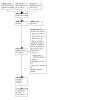


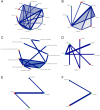
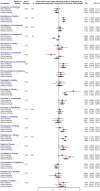


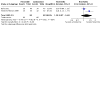
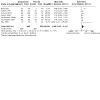
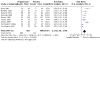
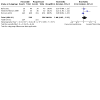
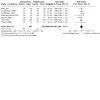
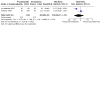
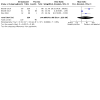
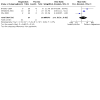


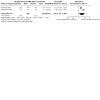


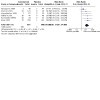
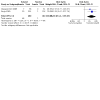
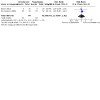
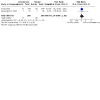
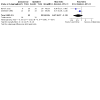


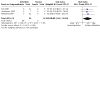
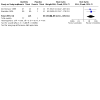

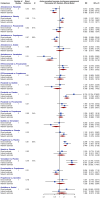

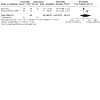
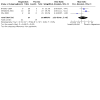
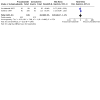
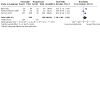
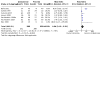
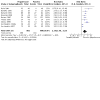
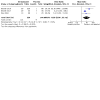
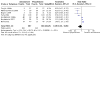


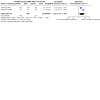


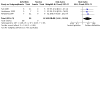
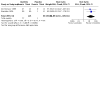

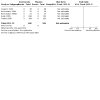
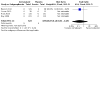

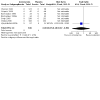
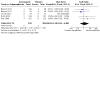
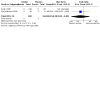

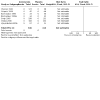
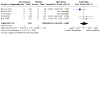
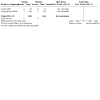












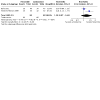
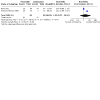
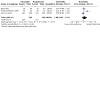
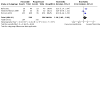
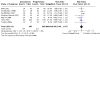
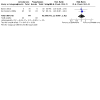
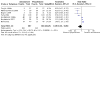
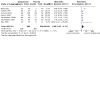
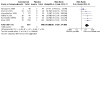
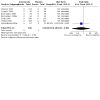
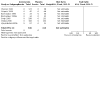
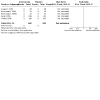
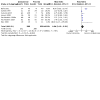
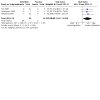
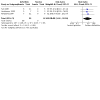
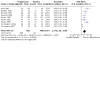
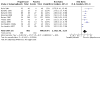
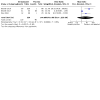
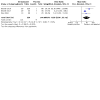
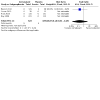
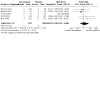
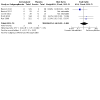
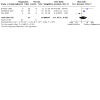
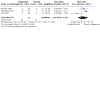
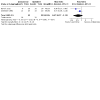
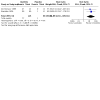
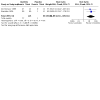
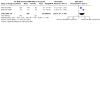
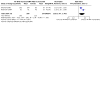
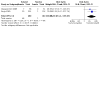
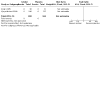
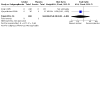
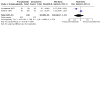
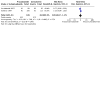
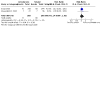
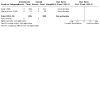
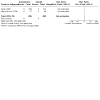
Update of
References
References to studies included in this review
Abi Mansour 1998 {published data only}
-
- Abi-Mansour P, Carberry PA, McCowan RJ, Henthorn RW, Dunn GH, Perry KT. Conversion efficacy and safety of repeated doses of ibutilide in patients with atrial flutter and atrial fibrillation. Study Investigators. American Heart Journal 1998;136(4 Pt 1):632-42. - PubMed
Aliot 1996 {published data only}
-
- Aliot E, Denjoy I, Flecainide AF French Study Group. Comparison of the safety and efficacy of flecainide versus propafenone in hospital out-patients with symptomatic paroxysmal atrial fibrillation/flutter. American Journal of Cardiology 1996;77(3):66A-71A. - PubMed
Alp 2000 {published data only}
-
- Alp NJ, Rahman S, Bell JA, Shahi M. Randomised comparison of antero-lateral versus antero-posterior paddle positions for DC cardioversion of persistent atrial fibrillation. International Journal of Cardiology 2000;75:211-6. - PubMed
Azpitarte 1997 {published data only}
-
- Azpitarte J, Alvarez M, Baun O, Garcia R, Moreno E, Martin F, et al. Value of single oral loading dose of propafenone in converting recent-onset atrial fibrillation. Results of a randomized, double-blind, controlled study. European Heart Journal 1997;18(10):1649-54. - PubMed
Balla 2011 {published data only}
-
- Balla I, Petrela E, Kondili A. Pharmacological conversion of recent atrial fibrillation: a randomized study of three antiarrhythmic drugs. Anadolu Kardiyol Derg 2011;11(7):600-6. - PubMed
-
- Balla I, Petrela E, Kondili A. Pharmacological conversion of recent atrial fibrillation: a randomized, placebo-controlled study of three antiarrhythmic drugs. Anadolu Kardiyol Derg 2011;11(7):600-6. [DOI: ] - PubMed
Baroffio 1995 {published data only}
-
- Baroffio R, Tisi G, Guzzini F, Milvio E, Annoni P. A randomised study comparing digoxin and propafenone in the treatment of recent onset atrial fibrillation. Clinical Drug Investigation 1995;9(5):277-83.
Baroni 2011 {published data only}
Beatch 2016 {published data only}
Beatch 2017 {published data only}
Bellandi 1995 {published data only}
-
- Bellandi F, Cantini F, Pedone T, Palchetti R, Bamoshmoosh M, Dabizzi RP, et al. Effectiveness of intravenous propafenone for conversion of recent-onset atrial fibrillation: a placebo-controlled study. Clinical Cardiology 1995;18(11):631-4. - PubMed
-
- Bellandi F, Dabizzi RP, Cantini F, Natale MD, Niccoli L. Intravenous propafenone: efficacy and safety in the conversion to sinus rhythm of recent onset atrial fibrillation - a single-blind placebo-controlled study. Cardiovascular Drugs and Therapy 1996;10(2):153-7. 19330684 - PubMed
Bellone 2012 {published data only}
-
- Bellone A, Etteri M, Vettorello M, Bonetti C, Clerici D, Gini G, et al. Cardioversion of acute atrial fibrillation in the emergency department: a prospective randomised trial. Emergency Medicine Journal 2012;29(3):188-91. [DOI: ] - PubMed
Bertini 1990 {published data only}
-
- Bertini G, Conti A, Fradella G, Francardelli L, Giglioli C, Mangialavori G, et al. Propafenone versus amiodarone in field treatment of primary atrial tachydysrhythmias. Journal of Emergency Medicine 1990;8(1):15-20. - PubMed
Bianconi 1998 {published data only}
-
- Bianconi L, Mennuni M, PAFIT-3 Investigators. Comparison between propafenone and digoxin administered intravenously to patients with acute atrial fibrillation. The Propafenone in Atrial Fibrillation Italian Trial. American Journal of Cardiology 1998;82(5):584-8. - PubMed
Bianconi 2000 {published data only}
-
- Bianconi L, Castro A, Dinelli M, Alboni P, Pappalardo A, Richiardi E, et al. Comparison of intravenously administered dofetilide versus amiodarone in the acute termination of atrial fibrillation and flutter. A multicentre, randomized, double-blind, placebo-controlled study. European Heart Journal 2000;21(15):1265-73. - PubMed
Blanc 1999 {published data only}
-
- Blanc JJ, Voinov C, Maarek M, PARSIFAL Study Group. Comparison of oral loading dose of propafenone and amiodarone for converting recent-onset atrial fibrillation. American Journal of Cardiology 1999;84(9):1029-32. - PubMed
Boriani 1997 {published data only}
-
- Boriani G, Biffi M, Capucci A, Botto GL, Broffoni T, Rubino I, et al. Oral loading with propafenone: a placebo-controlled study in elderly and nonelderly patients with recent onset atrial fibrillation. Pacing & Clinical Electrophysiology 1998;21(11 Pt 2):2465-9. 19330698 - PubMed
-
- Boriani G, Biffi M, Capucci A, Botto GL, Broffoni T, Rubino I, et al. Oral propafenone to convert recent-onset atrial fibrillation in patients with and without underlying heart disease. A randomized, controlled trial. Annals of Internal Medicine 1997;126(8):621-5. - PubMed
Botto 1999 {published data only}
Bouida 2019 {published data only}
-
- Bouida W, Beltaief K, Msolli MA, Azaiez N, Ben Soltane H, Sekma A, et al. Low-dose magnesium sulfate versus high dose in the early management of rapid atrial fibrillation: randomized controlled double-blind study (LOMAGHI study). Academic Emergency Medicine 2019;26(2):183-91. [DOI: ] - PubMed
Braždžionytė 2006 {published data only}
-
- Brazdzionyte J, Babarskiene RM, Stanaitiene G. Anterior-posterior versus anterior-lateral electrode position for biphasic cardioversion of atrial fibrillation. Medicina (Kaunas) 2006;42(12):994-8. - PubMed
Brodsky 1994 {published data only}
-
- Brodsky MA, Orlov MV, Capparelli EV, Allen BJ, Iseri LT, Ginkel M, et al. Magnesium therapy in new-onset atrial fibrillation. American Journal of Cardiology 1994;73(16):1227-9. - PubMed
Camm 2011 {published data only}
-
- Camm AJ, Capucci A, Hohnloser SH, Torp-Pedersen C, Van Gelder IC, Mangal B, et al, Investigators, Avro. A randomized active-controlled study comparing the efficacy and safety of vernakalant to amiodarone in recent-onset atrial fibrillation. Journal of the American College of Cardiology 2011;57(3):313-21. [DOI: ] - PubMed
Camm 2012 {published data only}
-
- Camm AJ, Toft E, Torp-Pedersen C, Vijayaraman P, Juul-Moller S, Ip J, et al. Efficacy and safety of vernakalant in patients with atrial flutter: a randomized, double-blind, placebo-controlled trial. Europace 2012;14(6):804-9. - PubMed
Channer 2004 {published data only}
-
- Channer KS, Birchall A, Steeds RP, Walters SJ, Yeo WW, West JN, et al. A randomized placebo-controlled trial of pre-treatment and short- or long-term maintenance therapy with amiodarone supporting DC cardioversion for persistent atrial fibrillation. European Heart Journal 2004;25(2):144-50. - PubMed
Chiladakis 2001 {published data only}
-
- Chiladakis JA, Stathopoulos C, Davlouros P, Manolis AS. Intravenous magnesium sulfate versus diltiazem in paroxysmal atrial fibrillation. International Journal of Cardiology 2001;79(2-3):287-91. - PubMed
Chu 2009 {published data only}
-
- Chu K, Evans R, Emerson G, Greenslade J, Brown A. Magnesium sulfate versus placebo for paroxysmal atrial fibrillation: a randomized clinical trial. Academic Emergency Medicine 2009;16(4):295-300. [DOI: ] - PubMed
Cotter 1999 {published data only}
-
- Cotter G, Blatt A, Kaluski E, Metzkor-Cotter E, Koren M, Litinski I, et al. Conversion of recent onset paroxysmal atrial fibrillation to normal sinus rhythm: the effect of no treatment and high-dose amiodarone. A randomized, placebo-controlled study. European Heart Journal 1999;20(24):1833-42. - PubMed
Cybulski 2003 {published data only}
Davey 2005 {published data only}
-
- Davey MJ, Teubner D. A randomized controlled trial of magnesium sulfate, in addition to usual care, for rate control in atrial fibrillation. Annals of Emergency Medicine 2005;45(4):347-53. - PubMed
Ellenbogen 1996 {published data only}
-
- Ellenbogen KA, Stambler BS, Wood MA, Sager PT, Wesley RC Jr, Meissner MC, et al. Efficacy of intravenous ibutilide for rapid termination of atrial fibrillation and atrial flutter: a dose-response study. Journal of the American College of Cardiology 1996;28(1):130-6. - PubMed
Fak 1997 {published data only}
-
- Fak AS, Tezcan H, Caymaz O, Tokay S, Oktay S, Oktay A, et al. Efficacy of intravenous propafenone in converting atrial fibrillation and flutter in sinus rhythm. Turk Kardiyoloji Dernegi Arsivi [Turkish] 1997;25(7):406-11 + 390-1. 19330746
-
- Fak AS, Tezcan H, Caymaz O, Tokay S, Oktay S, Oktay A. Intravenous propafenone for conversion of atrial fibrillation or flutter to sinus rhythm: a randomized, placebo-controlled, crossover study. Journal of Cardiovascular Pharmacological Therapy 1997;2(4):251-8. - PubMed
Falk 1997 {published data only}
-
- Falk RH, Pollak A, Singh SN, Friedrich T. Intravenous dofetilide, a class III antiarrhythmic agent, for the termination of sustained atrial fibrillation or flutter. Intravenous Dofetilide Investigators. Journal of the American College of Cardiology 1997;29(2):385-90. - PubMed
Fresco 1996 {published data only}
-
- Fresco C, Proclemer A, Pavan A, Buia G, Vicentini A, Pavan D, et al, Paroxysmal Atrial Fibrillation Italian Trial (PAFIT)-2 Investigators. Intravenous propafenone in paroxysmal atrial fibrillation: a randomized, placebo-controlled, double-blind, multicenter clinical trial. Clinical Cardiology 1996;19(5):409-12. - PubMed
Galperín 2001 {published data only}
-
- Galperin J, Elizari MV, Chiale PA, Molina RT, Ledesma R, Scapin AO, et al, Gefca Investigators-Gema Group, Buenos Aires Argentina. Efficacy of amiodarone for the termination of chronic atrial fibrillation and maintenance of normal sinus rhythm: a prospective, multicenter, randomized, controlled, double blind trial. Journal of Cardiovascular Pharmacological Therapy 2001;6(4):341-50. - PubMed
Ganau 1998 {published data only}
-
- Ganau G, Lenzi T, FAPS Investigators Study Group. Intravenous propafenone for converting recent onset atrial fibrillation in emergency departments: a randomized placebo-controlled multicenter trial. Journal of Emergency Medicine 1998;16(3):383-7. - PubMed
Halinen 1995 {published data only}
-
- Halinen MO, Huttunen M, Paakkinen S, Tarssanen L. Comparison of sotalol with digoxin-quinidine for conversion of acute atrial fibrillation to sinus rhythm (the Sotalol-Digoxin-Quinidine Trial). American Journal of Cardiology 1995;76(7):495-8. - PubMed
Hohnloser 1995 {published data only}
-
- Hohnloser SH, Loo AVD, Baedecker F, Hablawetz E. Effectivity and safety of sotalol verses chinidin in the conversion therapy of persistent atrial fibrillation: a prospective randomised comparison. Zeitschrift fur Kardiologie 1994;83 Suppl 1:13.
-
- Hohnloser SH, Van de Loo A, Baedeker F. Efficacy and proarrhythmic hazards of pharmacologic cardioversion of atrial fibrillation: prospective comparison of sotalol versus quinidine. Journal of the American College of Cardiology 1995;26(4):852-8. - PubMed
Jakobsson 1990 {published data only}
-
- Jakobsson J, Odmansson I, Nordlander R. Comparison of two different electrodes for the delivery of DC-shocks. Resuscitation 1990;20(1):25-9. - PubMed
Joseph 2000 {published data only}
-
- Joseph AP, Ward MR. A prospective, randomized controlled trial comparing the efficacy and safety of sotalol, amiodarone, and digoxin for the reversion of new-onset atrial fibrillation. Annals of Emergency Medicine 2000;36(1):1-9. - PubMed
Kanoupakis 2004 {published data only}
Khaykin 2003 {published data only}
-
- Khaykin Y, Newman D, Kowalewski M, Korley V, Dorian P. Biphasic versus monophasic cardioversion in shock-resistant atrial fibrillation. Journal of Cardiovascular Electrophysiology 2003;14(8):868-72. - PubMed
Kim 2003 {published data only}
-
- Kim ML, Kim SG, Park DS, Gross JN, Ferrick KJ, Palma EC, et al. Comparison of rectilinear biphasic waveform energy versus truncated exponential biphasic waveform energy for transthoracic cardioversion of atrial fibrillation. American Journal of Cardiology 2004;94(11):1438-40. [DOI: 10.1016/j.amjcard.2004.07.149] [PMID: ] - DOI - PubMed
-
- Kim SG, Kim M, Park D, Gross JN, Ferrick KJ, Palma EC, et al. Prospective randomized comparison of rectilinear biphasic waveform shock versus truncated exponential biphasic waveform shock for transthoracic cardioversion of atrial fibrillation. Journal of the American College of Cardiology 2003;41(6):138A. - PubMed
Kirchhof 2005 {published data only}
-
- Kirchhof P, Monnig G, Wasmer K, Heinecke A, Breithardt G, Eckardt L, et al. A trial of self-adhesive patch electrodes and hand-held paddle electrodes for external cardioversion of atrial fibrillation (MOBIPAPA). European Heart Journal 2005;26(13):1292-7. - PubMed
Kochiadakis 1998 {published data only}
-
- Kochiadakis GE, Igoumenidis NE, Solomou MC, Parthenakis FI, Christakis-Hampsas MG, Chlouverakis GI, et al. Conversion of atrial fibrillation to sinus rhythm using acute intravenous procainamide infusion. Cardiovascular Drugs Therapy 1998;12(1):75-81. - PubMed
Kochiadakis 1998a {published data only}
-
- Kochiadakis GE, Igoumenidis NE, Simantirakis EN, Marketou ME, Parthenakis FI, Mezilis NE, et al. Intravenous propafenone versus intravenous amiodarone in the management of atrial fibrillation of recent onset: a placebo-controlled study. Pacing & Clinical Electrophysiology 1998;21(11 Pt 2):2475-9. - PubMed
Kochiadakis 1999 {published data only}
-
- Kochiadakis GE, Igoumenidis NE, Solomou MC, Kaleboubas MD, Chlouverakis GI, Vardas PE. Efficacy of amiodarone for the termination of persistent atrial fibrillation. American Journal of Cardiology 1999;83(1):58-61. - PubMed
Kochiadakis 1999a {published data only}
-
- Kochiadakis GE, Igoumenidis NE, Parthenakis FI, Chlouverakis GI, Vardas PE. Amiodarone versus propafenone for conversion of chronic atrial fibrillation: results of a randomized, controlled study. Journal of the American College of Cardiology 1999;33(4):966-71. - PubMed
Kochiadakis 2007 {published data only}
-
- Kochiadakis GE, Igoumenidis NE, Hamilos ME, Marketou ME, Chlouverakis GI, Vardas PE. A comparative study of the efficacy and safety of procainamide versus propafenone versus amiodarone for the conversion of recent-onset atrial fibrillation. American Journal of Cardiology 2007;99(12):1721-5. - PubMed
Kosior 2009 {published data only}
-
- Kosior D, Kochanowski J, Scislo P, Piątkowski R, Postula M, Rabczenko D, et al. Efficacy and safety of oral propafenone versus quinidine in restoring sinus rhythm in patients with an attack of atrial fibrillation - a prospective randomized study [Skuteczność i bezpieczeństwo doustnego propafenonu versus chinidyny w przywracaniu rytmu zatokowego u chorych z napadem migotania przedsionków - prospektywne badanie randomizowane]. Folia Cardiologica Excerpta 2009;4(6):360-6.
-
- Kosior DA, Kochanowski J, Scislo P, Piatkowski R, Postula M, Rabczenko D, et al. Efficacy and tolerability of oral propafenone versus quinidine in the treatment of recent onset atrial fibrillation: a randomized, prospective study. Cardiology Journal 2009;16(6):521-7. - PubMed
Koster 2004 {published data only}
-
- Koster RW, Dorian P, Chapman FW, Schmitt PW, O'Grady SG, Walker RG. A randomized trial comparing monophasic and biphasic waveform shocks for external cardioversion of atrial fibrillation. American Heart Journal 2004;147(5):e20. - PubMed
Kühlkamp 1991 {published data only}
-
- Kuhlkamp V, Schmid F, Risler T, Seipel L. Randomized comparison of flecainide and cibenzoline in the conversion of atrial fibrillation. International Journal of Cardiology 1991;31(1):65-9. - PubMed
Kumagai 2000 {published data only}
-
- Kumagai K, Abe H, Hiraki T, Nakashima H, Oginosawa Y, Ikeda H, et al. Single oral administration of pilsicainide versus infusion of disopyramide for termination of paroxysmal atrial fibrillation: a multicenter trial. Pacing & Clinical Electrophysiology 2000;23(11 Pt 2):1880-2. [DOI: 10.1111/j.1540-8159.2000.tb07043.x] - DOI - PubMed
Lindeboom 2000 {published data only}
-
- Lindeboom JE, Kingma JH, Crijns HJ, Dunselman PH. Efficacy and safety of intravenous dofetilide for rapid termination of atrial fibrillation and atrial flutter. American Journal of Cardiology 2000;85(8):1031-3. - PubMed
Maciag 2017 {published data only}
-
- Farkowski M, Maciag A, Chwyczko T, Beckowski M, Syska P, Kowalik I, et al. Clinical efficacy of antazoline in rapid cardioversion of paroxysmal atrial fibrillation: a single centre, randomized, double blind, placebo controlled study. European Heart Journal 2015;Suppl 1:906. 19330748]
-
- Maciag A, Farkowski MM, Chwyczko T, Beckowski M, Syska P, Kowalik I, et al. Efficacy and safety of antazoline in the rapid cardioversion of paroxysmal atrial fibrillation (the AnPAF study). Europace 2017;19(10):1637-42. - PubMed
Madrid 1993 {published data only}
-
- Madrid AH, Moro C, Costa A, Lloret, Marfn H, Novo L, et al. Flecainide versus procainamide in the treatment of paroxystic atrial fibrillation. Revista Espanola de Cardiologia 1992 ;45(Suppl 1):43. 19330990
-
- Madrid AH, Moro C, Marin-Huerta E, Mestre JL, Novo L, Costa A. Comparison of flecainide and procainamide in cardioversion of atrial fibrillation. European Heart Journal 1993;14(8):1127-31. - PubMed
Manegold 2007 {published data only}
-
- Manegold JC, Israel CW, Ehrlich JR, Duray G, Pajitnev D, Wegener FT, et al. External cardioversion of atrial fibrillation in patients with implanted pacemaker or cardioverter-defibrillator systems: a randomized comparison of monophasic and biphasic shock energy application. European Heart Journal 2007;28(14):1731-8. - PubMed
Martínez‐Marcos 2000 {published data only}
-
- Martinez-Marcos FJ, Garcia-Garmendia JL, Ortega-Carpio A, Fernandez-Gomez JM, Santos JM, Camacho C. Comparison of intravenous flecainide, propafenone, and amiodarone for conversion of acute atrial fibrillation to sinus rhythm. American Journal of Cardiology 2000;86(9):950-3. - PubMed
Mattioli 1998 {published data only}
Mittal 2000 {published data only}
-
- Mittal S, Ayati S, Stein KM, Schwartzman D, Cavlovich D, Tchou PJ, et al. Transthoracic cardioversion of atrial fibrillation: comparison of rectilinear biphasic versus damped sine wave monophasic shocks. Circulation 2000;101(11):1282-7. - PubMed
Mortensen 2007 {published data only}
-
- Mortensen K, Risius T, Schwemer TF, Aydin MA, Köster R, Klemm HU, et al. Biphasic versus monophasic shock for external cardioversion of atrial flutter: a prospective, randomized trial. Cardiology 2008;111:57-62. - PubMed
-
- Risius T, Mortensen K, Schwerner T, Aydin MA, Henne S, Koster R, et al. Atrial flutter: Is biphasic superior to monophasic external cardioversion? A randomized comparison. Journal of the American College of Cardiology 2005;45(3):222A.
Muñoz‐Martínez 2010 {published data only}
-
- Munoz-Martinez T, Castaneda-Saiz A, Vinuesa-Lozano C, Aretxabala-Kortajarena N, Dudagoitia-Otaolea JL, Iribarren-Diarasarri S, et al. [Electrode position in elective electrical cardioversion of atrial fibrillation. A randomized study]. Medicine 2010;34(4):225-30. [DOI: ] - PubMed
Negrini 1994 {published data only}
-
- Negrini M, Gibelli G, De Ponti C. A comparison of propafenone and amiodarone in reversion of recent-onset atrial fibrillation to sinus rhythm. Current Therapeutic Research - Clinical and Experimental 1994;55(11):1345-54.
Neumann 2004 {published data only}
-
- Neumann T, Erdogan A, Reiner C, Siemon G, Kurzidim K, Berkowitsch A, et al. [Ambulatory electrocardioversion of atrial fibrillation by means of biphasic versus monophasic shock delivery. A prospective randomized study]. Zeitschrift für Kardiologie 2004;93(5):381-7. - PubMed
Noc 1990 {published data only}
-
- Noc M, Stajer D, Horvat M. Intravenous amiodarone versus verapamil for acute conversion of paroxysmal atrial fibrillation to sinus rhythm. American Journal of Cardiology 1990;65(9):679-80. - PubMed
Nogic 2022 {published data only}
-
- Nogic J, MacPherson M, Aldrige E, Sajeev JK, Roberts L, Lowman D, et al. Magnesium in the management of atrial fibrillation with rapid ventricular response. Journal of the American College: Clinical Electrophysiology 2022;8(6):800-2. - PubMed
Norgaard 1999 {published data only}
-
- Norgaard BL, Wachtell K, Christensen PD, Madsen B, Johansen JB, Christiansen EH, et al, Danish Dofetilide in Atrial Fibrillation and Flutter Study Group. Efficacy and safety of intravenously administered dofetilide in acute termination of atrial fibrillation and flutter: a multicenter, randomized, double-blind, placebo-controlled trial. American Heart Journal 1999;137(6):1062-9. - PubMed
Okishige 2000 {published data only}
-
- Okishige K, Nishizaki M, Azegami K, Igawa M, Yamawaki N, Aonuma K, Kanagawa Arrhythmia Task Force investigators. Pilsicainide for conversion and maintenance of sinus rhythm in chronic atrial fibrillation: a placebo-controlled, multicenter study. American Heart Journal 2000;140(3):e13. - PubMed
Okishige 2006 {published data only}
-
- Okishige K Fukunami M, Kumagai K, Atarashi H, Inoue H. Pharmacological conversion of persistent atrial fibrillation into sinus rhythm with oral pilsicainide: pilsicainide suppression trial for persistent atrial fibrillation II. Circulation Journal 2006;70(6):657-61. - PubMed
Page 2002 {published data only}
-
- Page RL, Kerber RE, Russell JK, Trouton T, Waktare J, Gallik D, et al, BiCard Investigators. Biphasic versus monophasic shock waveform for conversion of atrial fibrillation: the results of an international randomized, double-blind multicenter trial. Journal of the American College of Cardiology 2002;39(12):1956-63. - PubMed
Pratt 2010 {published data only}
-
- Pratt CM, Roy D, Torp-Pedersen C, Wyse DG, Toft E, Juul-Moller S, et al, Atrial Arrhythmia Conversion Trial Investigators. Usefulness of vernakalant hydrochloride injection for rapid conversion of atrial fibrillation. American Journal of Cardiology 2010;106(9):1277-83. [DOI: ] - PubMed
Rajagopalan 2014 {published data only}
-
- Rajagopalan B, Narasimha D, Bhatia A, Kim CH, Switzer DF, Curtis AB. Efficacy of intravenous magnesium for cardioversion of atrial fibrillation. Circulation. Conference: American Heart Association 2014;130(Suppl 2):no pagination. - PubMed
-
- Rajagopalan B, Shah Z, Narasimha D, Bhatia A, Kim CH, Switzer DF, et al. Efficacy of intravenous magnesium in facilitating cardioversion of atrial fibrillation. Circulation. Arrhythmia & Electrophysiology 2016;9:e003968. - PubMed
Reisinger 1998 {published data only}
-
- Reisinger J, Gatterer E, Heinze G, Wiesinger K, Zeindlhofer E, Gattermeier M, et al. Prospective comparison of flecainide versus sotalol for immediate cardioversion of atrial fibrillation. American Journal of Cardiology 1998;81(12):1450-4. - PubMed
-
- Reisinger J, Gatterer E, Slany KP. Comparison between flecainid and sotalol in the conversion treatment of atrial fibrillation. Zeitschrift fur Kardiologie 1998;87(5):390.
Reisinger 2004 {published data only}
-
- Reisinger J, Gatterer E, Lang W, Vanicek T, Eisserer G, Bachleitner T, et al. Flecainide versus ibutilide for immediate cardioversion of atrial fibrillation of recent onset. European Heart Journal 2004;25(15):1318-24. - PubMed
Ricard 2001 {published data only}
-
- Ricard P, Levy S, Boccara G, Lakhal E, Bardy G. External cardioversion of atrial fibrillation: comparison of biphasic vs monophasic waveform shocks. Europace 2001;3(2):96-9. - PubMed
Risius 2009 {published data only}
-
- Risius T, Mortensen K, Schwemer TF, Aydin MA, Klemm HU, Ventura R, et al. Comparison of antero-lateral versus antero-posterior electrode position for biphasic external cardioversion of atrial flutter. American Journal of Cardiology 2009;104:1547-50. - PubMed
Romano 2001 {published data only}
-
- Romano S, Fattore L, Toscano G, Corsini F, Coppo A, Catanzaro M, et al. [Effectiveness and side effects of the treatment with propafenone and flecainide for recent-onset atrial fibrillation]. Giornale Italiano di Cardiologia 2001;2(1):41-5. - PubMed
-
- Romano S, Toscano S. Propafenone and e.v. flecainide in paroxysmal atrial fibrillation. Giornale Italiano di Cardiologia 1997;27(Suppl 1):58.
-
- Romano S, Toscano S. Propafenone or flecainide e.v. in atrial paroxistic fibrillation. Giornale Italiano di Cardiologia 1995;25(Suppl 1):445.
Roy 2004 {published data only}
-
- Harris S, Tepper D, Ip R. Vernakalant hydrochloride for rapid conversion of atrial fibrillation: a phase 3, randomized, placebo-controlled trial. Congestive Heart Failure 2013;14:4. - PubMed
-
- Roy D, Rowe BH, Stiell IG, Coutu B, Ip JH, Phaneuf D, et al. A randomized, controlled trial of RSD1235, a novel anti-arrhythmic agent, in the treatment of recent onset atrial fibrillation. Journal of the American College of Cardiology 2004;44:2355-61. - PubMed
Roy 2008 {published data only}
-
- Roy D, Pratt CM, Torp-Pedersen C, Wyse DG, Toft E, Juul-Moller S, et al, Atrial Arrhythmia Conversion Trial Investigators. Vernakalant hydrochloride for rapid conversion of atrial fibrillation: a phase 3, randomized, placebo-controlled trial. Circulation 2008;117(12):1518-25. [DOI: ] - PubMed
Satullo 1996a {published data only}
-
- Satullo G, Arrigo F, Cavallaro L, Coglitore A, Fazio F, Saporito F, et al. [A comparison between propafenone and hydroquinidine perorally in the treatment of recent-onset atrial fibrillation]. Minerva Cardioangiologica 1996;44(3):141-4. - PubMed
Scheuermeyer 2019 {published data only}
-
- Scheuermeyer FX, Andolfatto G, Christenson J, Couperthwaite S, Villa-Roel C, Lobay K, et al. LO100: Electrical vs chemical cardioversion in patients with acute atrial fibrillation: a multicenter parallel group randomized controlled clinical trial. Canadian Journal of Emergency Medicine 2016;18(S1):S64-5. [DOI: 10.1017/cem.2016.137] - DOI
-
- Scheuermeyer FX, Andolfatto G, Christenson J, Villa-Roel C, Rowe B. A multicenter randomized trial to evaluate a chemical-first or electrical-first cardioversion strategy for patients with uncomplicated acute atrial fibrillation. Academic Emergency Medicine 2019;26(9):969-81. [DOI: ] - PubMed
Schmidt 2017 {published data only}
Schmidt 2019 {published data only}
Schmidt 2021 {published data only}
-
- Schmidt AS, Lauridsen KG, Møller DS, Christensen PD, Dodt KK, Rickers H, et al. Anterior–lateral versus anterior–posterior electrode position for cardioverting atrial fibrillation. Circulation 2021;144:1995-2003. - PubMed
Siaplaouras 2004 {published data only}
Siaplaouras 2005 {published data only}
-
- Siaplaouras S, Buob A, Rötter C, Böhm M, Jung J. Randomized comparison of anterolateral versus anteroposterior electrode position for biphasic external cardioversion of atrial fibrillation. American Heart Journal 2005;150:150-2. - PubMed
Simon 2017 {published data only}
-
- Simon A, Niederdockl J, Skyllouriotis E, Schutz N, Weiser C, Herkner H, et al. Vernakalant shows superiority to ibutilide in recent-onset atrial fibrillation: a randomized controlled trial at the emergency department. Circulation. Conference: American Heart Association 2015;Suppl 3:132.
-
- Simon A, Niederdoeckl J, Skyllouriotis E, Schuetz N, Herkner H, Weiser C, et al. Vernakalant is superior to ibutilide for achieving sinus rhythm in patients with recent-onset atrial fibrillation: a randomized controlled trial at the emergency department. Europace 2017;19(2):233-40. [DOI: ] - PMC - PubMed
Singh 2000 {published data only}
-
- Singh S, Zoble RG, Yellen L, Brodsky MA, Feld GK, Berk M, et al. Efficacy and safety of oral dofetilide in converting to and maintaining sinus rhythm in patients with chronic atrial fibrillation or atrial flutter: the symptomatic atrial fibrillation investigative research on dofetilide (SAFIRE-D) study. Circulation 2000;102(19):2385-90. - PubMed
Singh 2005 {published data only}
-
- Singh BN, Singh SN, Reda DJ, Tang CX, Lopez B, Fye CL, et al. Efficacy of sotalol, amiodarone and placebo for cardioversion and maintenance of sinus rhythm in patients with atrial fibrillation: a Veterans Administration cooperative study. Circulation 2003;108(17):508.
-
- Singh SN, Singh BN, Reda DJ, Fye CL, Ezekowitz MD, Fletcher RD, et al. Comparison of sotalol versus amiodarone in maintaining stability of sinus rhythm in patients with atrial fibrillation (Sotalol-Amiodarone Fibrillation Efficacy Trial [Safe-T]). American Journal of Cardiology 2003;92(4):468-72. [DOI: 10.1016/s0002-9149(03)00671-4] [PMID: ] - DOI - PubMed
-
- Singh SN, Tang XC, Reda D, Singh BN. Systematic electrocardioversion for atrial fibrillation and role of antiarrhythmic drugs: a substudy of the SAFE-T trial. Heart Rhythm 2009;6(2):152-5. 19330904 - PubMed
Squara 2021 {published data only}
-
- Squara F, Elbaum C, Garret G, Liprandi L, Scarlatti D, Bun S, et al. Active compression versus standard anterior-posterior defibrillation for external cardioversion of atrial fibrillation: a prospective randomized study. Heart Rhythm 2021;18:360-5. - PubMed
Stambler 1996 {published data only}
-
- Stambler BS, Wood MA, Ellenbogen KA, Perry KT, Wakefield LK, VanderLugt JT, Ibutilide Repeat Dose Study Investigators. Efficacy and safety of repeated intravenous doses of ibutilide for rapid conversion of atrial flutter or fibrillation. Circulation 1996;94(7):1613-21. - PubMed
Stanaitienė 2008 {published data only}
-
- Stanaitiene G, Babarskiene RM. [Impact of electrical shock waveform and paddle positions on efficacy of direct current cardioversion for atrial fibrillation]. Medicina (Kaunas) 2008;44(9):665-72. - PubMed
-
- Stanaitiene G. Low energy electrical cardioversion of atrial fibrillation. Cardiology 2009;1:67. 19330914 [DOI: ]
Stroobandt 1997 {published data only}
-
- Stroobandt R, Stiels B, Hoebrechts R, Propafenone Atrial Fibrillation Trial Investigators. Propafenone for conversion and prophylaxis of atrial fibrillation. American Journal of Cardiology 1997;79(4):418-23. - PubMed
Sun 2005 {published data only}
-
- Sun JL, Guo JH, Zhang N, Zhang HC, Zhang P. Clinical comparison of ibutilide and propafenone for converting atrial flutter. Cardiovascular Drugs and Therapy 2005;19(1):57-64. - PubMed
Suttorp 1989 {published data only}
-
- Suttorp MJ, Kingma JH, Lie A, Huen L, Mast EG. Intravenous flecainide versus verapamil for acute conversion of paroxysmal atrial fibrillation or flutter to sinus rhythm. American Journal of Cardiology 1989;63(11):693-6. - PubMed
Suttorp 1990 {published data only}
-
- Suttorp MJ, Kingma JH, Jessurun ER, Lie A, Huen L, Van Hemel NM, et al. The value of class IC antiarrhythmic drugs for acute conversion of paroxysmal atrial fibrillation or flutter to sinus rhythm. Journal of the American College of Cardiology 1990;16(7):1722-7. - PubMed
Taha 2022 {published data only}
Thomas 2004 {published data only}
-
- Thomas SP, Guy D, Wallace E, Crampton R, Kijvanit P, Eipper V, et al. Rapid loading of sotalol or amiodarone for management of recent onset symptomatic atrial fibrillation: a randomized, digoxin-controlled trial. American Heart Journal 2004;147(1):E3. - PubMed
Treglia 1994a {published data only}
-
- Treglia A, Alfano C, Rossini E. [A comparison between propafenone and amiodarone in the conversion to sinus rhythm of atrial fibrillation of recent onset]. Minerva Cardioangiologica 1994;42(6):293-7. - PubMed
Trendafilova 2021 {published data only}
Vardas 2000 {published data only}
-
- Vardas PE, Kochiadakis GE, Igoumenidis NE, Tsatsakis AM, Simantirakis EN, Chlouverakis GI. Amiodarone as a first-choice drug for restoring sinus rhythm in patients with atrial fibrillation: a randomized, controlled study. Chest 2000;117(6):1538-45. - PubMed
Vijayalakshmi 2006 {published data only}
-
- Vijayalakshmi K, Sutton AGC, Campbell P, Davies A, Stewart MJ, Linker NJ, et al. Randomised trial of two anti-arrhythmic agents (amiodarone and sotalol) in patients with atrial fibrillation for whom DC cardioversion is planned. Heart 2003;89:A40. - PubMed
-
- Vijayalakshmi K, Whittaker VJ, Sutton A, Campbell P, Wright RA, Hall JA, et al. A randomized trial of prophylactic antiarrhythmic agents (amiodarone and sotalol) in patients with atrial fibrillation for whom direct current cardioversion is planned. American Heart Journal 2006;151(4):863.e1-6. - PubMed
Vogiatzis 2009 {published data only}
-
- Vogiatzis IA, Sachpekidis V, Vogiatzis IM, Kambitsi E, Karamitsos T, Samanidis D, et al. External cardioversion of atrial fibrillation: the role of electrode position on cardioversion success. International Journal of Cardiology 2009;137(1):e8-10. [DOI: ] - PubMed
Vogiatzis 2017 {published data only}
Volgman 1998 {published data only}
-
- Volgman AS, Carberry PA, Stambler B, Lewis WR, Dunn GH, Perry KT, et al. Conversion efficacy and safety of intravenous ibutilide compared with intravenous procainamide in patients with atrial flutter or fibrillation. Journal of the American College of Cardiology 1998;31(6):1414-9. - PubMed
Vos 1998 {published data only}
Voskoboinik 2018 {published data only}
-
- Voskoboinik A, Moskovitch J, Bloom J, Nalliah CJ, Prabhu S, Wong G, et al. Hand-held paddles more effective than adhesive patches for cardioversion of atrial fibrillation in obese patients: results from the DCR-BMI multicenter randomized controlled trial. Heart Rhythm 2018;15(5 Supplement 1):S261-2.
-
- Voskoboinik A, Moskovitch J, Plunkett G, Bloom J, Wong G, Nalliah C, et al. Cardioversion of atrial fibrillation in obese patients: results from the Cardioversion-BMI randomized controlled trial. Journal of Cardiovascular Electrophysiology 2019;30:155-61. - PubMed
Walsh 2005 {published data only}
-
- Walsh SJ, McCarty D, McClelland AJ, Owens CG, Trouton TG, Harbinson MT, et al. Impedance compensated biphasic waveforms for transthoracic cardioversion of atrial fibrillation: a multi-centre comparison of antero-apical and antero-posterior pad positions. European Heart Journal 2005;26(13):1298-302. - PubMed
Xanthos 2007 {published data only}
-
- Xanthos T, Prapa V, Papadimitriou D, Papadimitriou L. Comparative study of intravenous amiodarone and procainamide in the treatment of atrial fibrillation of recent onset. Minerva Cardioangiologica 2007;55(4):433-41. - PubMed
Yamase 2012 {published data only}
-
- Yamase M, Nakazato Y, Daida H. Effectiveness of amiodarone versus bepridil in achieving conversion to sinus rhythm in patients with persistent atrial fibrillation: a randomised trial. Heart 2012;98(14):1067-71. - PubMed
-
- Yamase M, Nakazato Y, Enjyoji Y. Conversion to sinus rhythm: efficacy of amiodarone vs bepridil for persistent atrial fibrillation. Journal of Interventional Cardiac Electrophysiology 2012;33(3):331. 19330956 [DOI: ]
Yamashita 2009 {published data only}
-
- Yamashita T, Ogawa S, Sato T, Aizawa Y, Atarashi H, Fujiki A, et al. Dose-response effects of bepridil in patients with persistent atrial fibrillation monitored with transtelephonic electrocardiograms: a multicenter, randomized, placebo-controlled,double-blind study (J-BAF Study). Circulation Journal 2009;73(6):1020-7. - PubMed
Yu 2013 {published data only}
-
- Yu Z, Xiang M, Ma C, Zhang S, Yang Y. [Efficacy and safety of ibutilide for conversion of atrial fibrillation/flutter]. Zhejiang Da Xue Xue Bao Yi Xue Ban 2013;42(2):212-6. - PubMed
Zehender 1994 {published data only}
-
- Zehender M, Meinertz T, Just H. Amiodaron and verapamil/chinidin in the treatment of patients with chronic atrial fibrillation [German]. Zeitschrift fur Kardiologie 1994;83(Suppl 5):101-8. - PubMed
Zhang 2005 {published data only}
-
- Zhang HC, Guo JH, Fang Q, Zheng YA, Sun YM, Zhu WQ, et al. [Immediate cardioversion of atrial fibrillation and atrial flutter lasting less than 90 days by ibutilide versus propafenone: a multicenter study]. Chung Hua I Hsueh Tsa Chih 2005;85(12):798-801. - PubMed
References to studies excluded from this review
Aizawa 2010 {published data only}
-
- Aizawa Y, Kohsaka S, Suzuki S, Atarashi H, Kamakura S, Sakurai M, et al. Comparison of antiarrhythmics used in patients with paroxysmal atrial fibrillation: subanalysis of J-RHYTHM study. Circulation Journal 2010;74(1):71-6. - PubMed
Akel 2018 {published data only}
Alboni 2004 {published data only}
-
- Alboni P, Botto GL, Baldi N, Luzi M, Russo V, Gianfranchi L, et al. Outpatient treatment of recent-onset atrial fibrillation with the "pill-in-the-pocket" approach. New England Journal of Medicine 2004;351(23):2384-91. - PubMed
Alpert 2000 {published data only}
-
- Alpert MA. Medical cardioversion of atrial fibrillation. Chest 2000;117(6):1529-31. - PubMed
Benhalla 2015 {published data only}
-
- Benhalla H, Fennich N. What about magnesium sulfate in atrial fibrillation with acute heart failure? European Journal of Heart Failure 2015;1):400.
Borgeat 1986 {published data only}
-
- Borgeat A, Goy JJ, Maendly R, Kaufmann U, Grbic M, Sigwart U, et al. Flecainide versus quinidine for conversion of atrial fibrillation to sinus rhythm. American Journal of Cardiology 1986;58(6):496-8. - PubMed
Boriani 1998 {published data only}
-
- Boriani G, Biffi M, Capucci A, Botto G, Broffoni T, Ongari M, et al. Conversion of recent-onset atrial fibrillation to sinus rhythm: effects of different drug protocols. Pacing & Clinical Electrophysiology 1998;21(11 Pt 2):2470-4. - PubMed
Botto 1996 {published data only}
-
- Botto GL, Bonini W, Broffoni T, Molteni S, Lombardi R, Alfieri G, et al. Conversion of recent onset atrial fibrillation with single loading oral dose of propafenone: is in-hospital admission absolutely necessary? Pacing & Clinical Electrophysiology 1996;19(11 Pt 2):1939-43. - PubMed
Camm 2022 {published data only}
-
- Camm AJ, Crijns H, Elvan A, Tuininga Y, Badings E, Kuijper A, et al. Orally inhaled flecainide for the conversion of recent-onset, symptomatic atrial fibrillation to sinus rhythm: final results from the phase 2 instant trial. Circulation 2022;146:A12420. [DOI: ]
Conde 2013 {published data only}
-
- Aragon M, Conde D, Costabel JP, Lambardi MF, Trivi M, Giniger A, et al. Comparing the efficacy, hospitalization time and safety of vernakalant to propafenone in recent-onset atrial fibrillation in the emergency department. Europace 2013;2(Suppl):ii16. 19330662
-
- Conde D, Costabel JP, Aragon M, Lambardi F, Klein A, Corrales Barbosa A, et al. Propafenone versus vernakalant for conversion of recent-onset atrial fibrillation. Cardiovascular Therapeutics 2013;31(6):377-80. - PubMed
Crijns 1994 {published data only}
-
- Crijns HJ, Van Gelder IC, Kingma JH, Dunselman PH, Gosselink AT, Lie KI, et al. Atrial flutter can be terminated by a class III antiarrhythmic drug but not by a class IC drug. European Heart Journal 1994;15(10):1403-8. - PubMed
CTRI/2018/01/011248 2018 {published data only}
-
- CTRI/2018/01/011248. An open-label, multicentre, prospective, phase-IV study to evaluate the efficacy and safety of ibutilide fumarate injection (0.1 mg/mL) in the treatment of atrial fibrillation and flutter - IBUTILIDE PHASE IV. https://www.ctri.nic.in/Clinicaltrials/showallp.php?mid1=20124&EncHi... (date received 25 January 2018).
Dankner 2009 {published data only}
-
- Dankner R, Shahar A, Novikov I, Agmon U, Ziv A, Hod H, et al. Treatment of stable atrial fibrillation in the emergency department: a population-based comparison of electrical direct-current versus pharmacological cardioversion or conservative management. Cardiology 2009;112(4):270-8. - PubMed
Deedwania 1998 {published data only}
-
- Deedwania PC, Singh BN, Ellenbogen K, Fisher S, Fletcher R, Singh SN, Department of Veterans Affairs CHF-STAT Investigators. Spontaneous conversion and maintenance of sinus rhythm by amiodarone in patients with heart failure and atrial fibrillation: observations from the veterans affairs congestive heart failure survival trial of antiarrhythmic therapy (CHF-STAT). Circulation 1998;98(23):2574-9. - PubMed
Dittrich 2015 {published data only}
-
- Dittrich HC, Feld GK, Bahnson TD, Camm AJ, Golitsyn S, Katz A, et al. COR-ART: a multicenter, randomized, double-blind, placebo-controlled dose-ranging study to evaluate single oral doses of vanoxerine for conversion of recent-onset atrial fibrillation or flutter to normal sinus rhythm. Heart Rhythm 2015;12(6):1105-12. - PubMed
Dluzniewski 1994 {published data only}
-
- Dluzniewski M, Krol J, Kuch M, Syska-Suminska J, Cedro K. Increased efficacy of ajmaline after magnesium administration in the treatment of paroxysmal supraventricular tachyarrhythmias [Polish]. Kardiologia Polska 1994;41(9):201-6.
Donovan 1991 {published data only}
-
- Donovan KD, Dobb GJ, Coombs LJ, Lee KY, Weekes JN, Murdock CJ, et al. Reversion of recent-onset atrial fibrillation to sinus rhythm by intravenous flecainide. American Journal of Cardiology 1991;67(2):137-41. - PubMed
Donovan 1995 {published data only}
-
- Donovan KD, Power BM, Hockings BE, Dobb GJ, Lee KY. Intravenous flecainide versus amiodarone for recent-onset atrial fibrillation. American Journal of Cardiology 1995;75(10):693-7. - PubMed
Forney 2000 {published data only}
-
- Forney AJ, Schooff M. Is either sotalol or amiodarone more effective than digoxin for converting patients with new-onset atrial fibrillation (AF) to sinus rhythm within 48 hours? Journal of Family Practice 2000;49(11):982. - PubMed
Galve 1996 {published data only}
-
- Galve E, Rius T, Ballester R, Artaza MA, Arnau JM, Garcia-Dorado D, et al. Intravenous amiodarone in treatment of recent-onset atrial fibrillation: results of a randomized, controlled study. Journal of the American College of Cardiology 1996;27(5):1079-82. - PubMed
Gullestad 1993 {published data only}
-
- Gullestad L, Birkeland K, Molstad P, Hoyer MM, Vanberg P, Kjekshus J. The effect of magnesium versus verapamil on supraventricular arrhythmias. Clinical Cardiology 1993;16(5):429-34. - PubMed
Guo 1996 {published data only}
-
- Guo GB, Ellenbogen KA, Wood MA, Stambler BS. Conversion of atrial flutter by ibutilide is associated with increased atrial cycle length variability. Journal of the American College of Cardiology 1996;27(5):1083-9. - PubMed
Hermida 1995 {published data only}
-
- Hermida JS, Mabo P, Rouesnel P, Scheck F, Canler A, Barthelemy M, et al. [Comparative study of the efficacy and tolerability of 2 modalities of intravenous cibenzoline administration in the reduction of recent spontaneous atrial arrhythmia]. Annales de Cardiologie Angeiologie (Paris) 1995;44(1):49-55. - PubMed
Hohnloser 2004 {published data only}
-
- Hohnloser SH, Dorian P, Straub M, Beckmann K, Kowey P. Safety and efficacy of intravenously administered tedisamil for rapid conversion of recent-onset atrial fibrillation or atrial flutter. Journal of the American College of Cardiology 2004;44(1):99-104. - PubMed
Hou 1995 {published data only}
-
- Hou ZY, Chang MS, Chen CY, Tu MS, Lin SL, Chiang HT, et al. Acute treatment of recent-onset atrial fibrillation and flutter with a tailored dosing regimen of intravenous amiodarone. A randomized, digoxin-controlled study. European Heart Journal 1995;16(4):521-8. - PubMed
Huang 2003 {published data only}
-
- Huang SW, Wang L, Xia JZ. Comparison of the efficacy and safety of intravenous esmolol and deslanoside in decreasing heart rate of patients with rapid atrial fibrillation. Journal of Binzhou Medical College 2003;26(2):95‐7.
Jacobs 1998 {published data only}
-
- Jacobs LO, Andrews TC, Pederson DN, Donovan DJ. Effect of intravenous procainamide on direct-current cardioversion of atrial fibrillation. American Journal of Cardiology 1998;82(2):241-2. - PubMed
Kafkas 2007 {published data only}
-
- Kafkas NV, Patsilinakos SP, Mertzanos GA, Papageorgiou KI, Chaveles JI, Dagadaki OK, et al. Conversion efficacy of intravenous ibutilide compared with intravenous amiodarone in patients with recent-onset atrial fibrillation and atrial flutter. International Journal of Cardiology 2007;118(3):321-5. - PubMed
Kanoupakis 2003a {published data only}
-
- Kanoupakis EM, Kochiadakis GE, Manios EG, Igoumenidis NE, Mavrakis HE, Vardas PE. Pharmacological cardioversion of recent onset atrial fibrillation with intravenous amiodarone in patients receiving long-term amiodarone therapy: is it reasonable? Journal of Interventional Cardiology & Electrophysiology 2003;8(1):19-26. - PubMed
Katcher 1997 {published data only}
-
- Katcher MS, Estes NA 3rd. Pharmacologic conversion of atrial fibrillation and atrial flutter to normal sinus rhythm: the role of ibutilide. Pharmacotherapy 1997;17(1):177-80. - PubMed
Kerin 1996 {published data only}
-
- Kerin NZ, Faitel K, Naini M. The efficacy of intravenous amiodarone for the conversion of chronic atrial fibrillation. Amiodarone vs quinidine for conversion of atrial fibrillation. Archives of Internal Medicine 1996;156(1):49-53. - PubMed
Kingma 1992 {published data only}
-
- Kingma JH, Suttorp MJ. Acute pharmacologic conversion of atrial fibrillation and flutter: the role of flecainide, propafenone, and verapamil. American Journal of Cardiology 1992;70(5):56A-60A; discussion 60A-61A. - PubMed
Kirchhof 2002 {published data only}
-
- Kirchhof P, Eckardt L, Loh P, Weber K, Fischer RJ, Seidl KH, et al. Anterior-posterior versus anterior-lateral electrode positions for external cardioversion of atrial fibrillation: a randomised trial. Lancet 2002;360(9342):1275-9. - PubMed
Kirilmaz 2001 {published data only}
-
- Kirilmaz A, Erinc K, Kilicarslan F, Demirtas E. Fourier transformation analysis of atrial fibrillation intervals following ibutilide and procainamide to predict successful cardioversion. Turk Kardiyoloji Dernegi Arsivi 2001;29(8):481-487 + 462.
Kowey 2009 {published data only}
-
- Kowey PR, Dorian P, Mitchell LB, Pratt CM, Roy D, Schwartz PJ, et al. Vernakalant hydrochloride for the rapid conversion of atrial fibrillation after cardiac surgery a randomized, double-blind, placebo-controlled trial. Circulation: Arrhythmia and Electrophysiology 2009;2(6):652-9. - PubMed
Levi 1973 {published data only}
-
- Levi G, Proto C, Rovetta A. Double-blind evaluation of practolol and quinidine in the treatment of chronic atrial fibrillation. Cardiology 1973;58(6):364-8. - PubMed
Marrouche 2000 {published data only}
-
- Marrouche NF, Reddy RK, Wittkowsky AK, Bardy GH. High-dose bolus lidocaine for chemical cardioversion of atrial fibrillation: a prospective, randomized, double-blind crossover trial. American Heart Journal 2000;139(6):E8-11. - PubMed
Martinelli 2003 {published data only}
-
- Martinelli MM, Dragagna G, Vitali A, Fedele F. [Verapamil in the cardioversion of atrial fibrillation. Clinical study]. Minerva Cardioangiologia 2003;51(1):49-53. - PubMed
Masini 1990 {published data only}
-
- Masini M, Ieri A, Lorenzoni R, Bartoli P, Lencioni G, Zipoli A, et al. [Comparison of lidoflazine and quinidine in the conversion to sinusal rhythm in atrial fibrillation of recent onset]. Giornale Italiano di Cardiologia 1990;20(3):202-6. - PubMed
Mathew 1999 {published data only}
Mieure 2011 {published data only}
-
- Mieure KD, Moranville MP, Park JJ, Lat I, Jennings HR, Lazar S, et al. A comparison of intravenous rate control agents for new onset atrial fibrillation with rapid ventricular rate. Heart Rhythm 2011;1:S216-7.
Mironov 2019 {published data only}
-
- Mironov N, Vlodzyanovsky V, Yuricheva Y, Sokolov S, Golitsyn S, Rosenstraukh L, et al. Safety and effectiveness of pharmacological conversion and direct current cardioversion in persistent atrial fibrillation: results of randomized trial. Journal of the American College of Cardiology 2019;73(9):298.
-
- Mironov NY, Vlodzyanovskiy VV, Yuricheva YA, Sokolov SF, Golitsyn SP, Rosenstraukh L, et al. Safety and effectiveness of electrical and pharmacological cardioversion in persistent atrial fibrillation. Part I: Study rationale, design and assessment of effectiveness [Russian]. Rational Pharmacotherapy in Cardiology 2018;14(5):664-9. 19330840
Nieuwlaat 2011 {published data only}
-
- Nieuwlaat R, Hohnloser SH, Connolly SJ. Effect of dronedarone in patients with permanent atrial fibrillation during the ATHENA study. European Heart Journal 2011;1:618.
Niwano 2009 {published data only}
-
- Niwano S, Sasaki T, Kurokawa S, Kiryu M, Fukaya H, Hatakeyama Y, et al. Predicting the efficacy of antiarrhythmic agents for interrupting persistent atrial fibrillation according to spectral analysis of the fibrillation waves on the surface ECG. Circulation Journal 2009;73(7):1210-8. - PubMed
Oral 1999 {published data only}
-
- Oral H, Brinkman K, Pelosi F, Flemming M, Tse HF, Kim MH, et al. Effect of electrode polarity on the energy required for transthoracic atrial defibrillation. American Journal of Cardiology 1999;84(2):228-30, A8. - PubMed
Pedersen 2001 {published data only}
-
- Pedersen OD, Bagger H, Keller N, Marchant B, Kober L, Torp-Pedersen C. Efficacy of dofetilide in the treatment of atrial fibrillation-flutter in patients with reduced left ventricular function: a Danish investigations of arrhythmia and mortality on dofetilide (Diamond) substudy. Circulation 2001;104(3):292-6. - PubMed
Peuhkurinen 2000 {published data only}
-
- Peuhkurinen K, Niemela M, Ylitalo A, Linnaluoto M, Lilja M, Juvonen J. Effectiveness of amiodarone as a single oral dose for recent-onset atrial fibrillation. American Journal of Cardiology 2000;85(4):462-5. - PubMed
Pluymaekers 2019 {published data only}
Pohjantahti‐Maaroos 2017 {published data only}
-
- Pohjantahti-Maaroos H, Hyppola H, Lekkala M, Sinisalo E, Heikkola A, Hartikainen J, et al. Intravenous vernakalant in comparison with intravenous flecainide in the cardioversion of recent-onset atrial fibrillation. European Heart Journal of Acute Cardiovascular Care 2019;8(2):114-20. - PubMed
Rashba 2002 {published data only}
-
- Rashba EJ, Bouhouch R, MacMurdy KA, Shorofsky SR, Peters RW, Gold MR. Effect of shock polarity on the efficacy of transthoracic atrial defibrillation. American Heart Journal 2002;143(3):541-5. - PubMed
Rho 2003 {published data only}
-
- Rho RW, Page RL. Biphasic versus monophasic shock waveform for conversion of atrial fibrillation. Cardiac Electrophysiology Review 2003;7(3):290-1. - PubMed
Sosnowski 2004 {published data only}
-
- Anonymous. Trial finds sustained release propafenone increases time to recurrent atrial fibrillation compared with placebo. Evidence-based Cardiovascular Medicine 2004;8(1):44-5; discussion 46-7. - PubMed
Stambler 1997 {published data only}
-
- Stambler BS, Wood MA, Ellenbogen KA. Antiarrhythmic actions of intravenous ibutilide compared with procainamide during human atrial flutter and fibrillation: electrophysiological determinants of enhanced conversion efficacy. Circulation 1997;96(12):4298-306. - PubMed
Stiell 2020 {published data only}
-
- Stiell I, Perry J, Birnie D, Macle L, Vadeboncoeur A, Thiruganasambandamoorthy V, et al. PL02: A randomized, controlled comparison of electrical versus pharmacological cardioversion for emergency department patients with recent-onset atrial fibrillation. Canadian Journal of Emergency Medicine 2019;21(S1):S5. [DOI: 10.1017/cem.2019.41] - DOI
-
- Stiell I, Sivilotti M, Taljaard M, Birnie D, Vadeboncoeur A, Hohl C, et al. A randomized, controlled comparison of electrical versus pharmacological cardioversion for emergency department patients with atrial flutter. Canadian Journal of Emergency Medicine 2020;22:S9. 21117791 - PubMed
-
- Stiell IG, Sivilotti MLA, Taljaard M, Birnie D, Vadeboncoeur A, Hohl CM, et al. Electrical versus pharmacological cardioversion for emergency department patients with acute atrial fibrillation (RAFF2): a partial factorial randomised trial. Lancet (London, England) 2020;395(10221):339-49. [DOI: ] - PubMed
Stiell 2021 {published data only}
-
- Stiell IG, Eagles D, Nemnom MJ, Brown E, Taljaard M, Archambault PM, et al. Adverse events associated with electrical cardioversion in patients with acute atrial fibrillation and atrial flutter. Canadian Journal of Cardiology 2021;37:1775-82. - PubMed
Sung 1995 {published data only}
-
- Sung RJ, Tan HL, Karagounis L, Hanyok JJ, Falk R, Platia E, et al, Sotalol Multicenter Study Group. Intravenous sotalol for the termination of supraventricular tachycardia and atrial fibrillation and flutter: a multicenter, randomized, double-blind, placebo-controlled study. American Heart Journal 1995;129(4):739-48. - PubMed
Torp‐Pedersen 2013 {published data only}
-
- Torp-Pedersen C, Camm AJ, Butterfield NN, Dickinson G, Beatch GN. Vernakalant: conversion of atrial fibrillation in patients with ischemic heart disease. International Journal of Cardiology 2013;166(1):147-51. - PubMed
Tuseth 2005 {published data only}
Villani 2000 {published data only}
-
- Villani GQ, Piepoli MF, Terracciano C, Capucci A. Effects of diltiazem pretreatment on direct-current cardioversion in patients with persistent atrial fibrillation: a single-blind, randomized, controlled study. American Heart Journal 2000;140(3):e12. - PubMed
Vita 1989 {published data only}
-
- Vita JA, Friedman PL, Cantillon C, Antman EM. Efficacy of intravenous propafenone for the acute management of atrial fibrillation. American Journal of Cardiology 1989;63(17):1275‐8. - PubMed
Weiner 1994 {published data only}
-
- Weiner P, Ganam R, Ganem R, Zidan F, Rabner M. Clinical course of recent-onset atrial fibrillation treated with oral propafenone. Chest 1994;105(4):1013-6. - PubMed
Zadura 2001 {published data only}
-
- Zadura M, Grossmann G, Modrzewska A, Klecha T, Klepacka H, Ruminski W. [Comparison of efficacy, safety and cost-effectiveness of intravenous versus oral propafenone in paroxysmal atrial fibrillation]. Pol Merkur Lekarski 2001;11(62):137-9. - PubMed
Zhan 2003 {published data only}
-
- Zhan CY, Zhou DX, Yang GT, Deng PZ. A comparative study on the efficacy and safety of intravenous amiodarone and lanatoside C for the treatment of rapid ventricular rate in patients with atrial fibrillation and congestive heart falure. Journal of Emergency Medicine 2003;12(3):188‐90.
References to studies awaiting assessment
Antonelli 2004 {published data only}
-
- Antonelli D, Freedberg NA, Feldman A, Darawsha A, Rosenfeld T. Intravenous propafenone for conversion of atrial fibrillation in the emergency room [Hebrew]. Harefuah 2004;143(7):471-4 + 551-2. - PubMed
Baldi 1990 {published data only}
-
- Baldi N, Marasco G, Russo VA, Lenti V, Polimeni G, Montervino C, et al. Flecainide acetate vs digoxin in acute treatment of atrial fibrillation of recent onset: a randomized study. New Trends in Arrhythmias 1990;6(1-2):867-72.
Baldi 1992 {published data only}
-
- Baldi N, Lenti V, Marasco G, Russo VA, Montervino C. Propafenone vs flecainide in the acute treatment of atrial fibrillation of recent onset: a randomized study. New Trends in Arrhythmias 1992;8(1-2):499-505.
Botto 1993 {published data only}
-
- Botto GL, Falcone C. A randomized controlled study between placebo vs propafenone per os in a recent cardioversion of atrial fibrillation. Giornale Italiano di Cardiologia 1993;23(Suppl 1):141.
Botto 1995 {published data only}
-
- Botto GL, Politi A. The efficacy of transthoracic electric cardioversion of the atrial fibrillation is not influenced by the position of the defriblillation platelets. A randomized controlled cross-over study. Giornale Italiano di Cardiologia 1995;25(Suppl 1):271.
Botto 1996a {published data only}
-
- Botto GL, Bonini W. Oral propafenone or digoxin in the treament of early atrial fibrillation cardioversion: a randomized study controlled with placebo. Giornale Italiano di Cardiologia 1996;26(Suppl 1):32.
Capucci 1991 {published data only}
-
- Capucci A, Lenzi T. Effect of fleicainide per os and amiodarione i.v. in the cardioversion of atrial fibrillation: a randomized study controlled with palcebo. Giornale Italiano di Cardiologia 1991;21(Suppl 1):36.
Capucci 1992 {published data only}
-
- Capucci A, Lenzi T, Boriani G, Trisolino G, Binetti N, Cavazza M, et al. Effectiveness of loading oral flecainide for converting recent-onset atrial fibrillation to sinus rhythm in patients without organic heart disease or with only systemic hypertension. American Journal of Cardiology 1992;70(1):69-72. - PubMed
Capucci 1993 {published data only}
-
- Capucci A, Boriani G. Controlled clinical trial on the efficacy of propafenone or flecainide per os in the conversion of sinus rhythm of early atrial fibrillation. Giornale Italiano di Cardiologia 1993;23(Suppl 1):142.
Capucci 1994 {published data only}
-
- Capucci A, Boriani G, Rubino I, Della Casa S, Sanguinetti M, Magnani B, et al. A controlled study on oral propafenone versus digoxin plus quinidine in converting recent onset atrial fibrillation to sinus rhythm. International Journal of Cardiology 1994;43(3):305-13. - PubMed
Capucci 1999 {published data only}
-
- Capucci A, Villani GQ, Aschieri D, Piepoli M. Safety of oral propafenone in the conversion of recent onset atrial fibrillation to sinus rhythm: a prospective parallel placebo-controlled multicentre study. International Journal of Cardiology 1999;68(2):187-96. - PubMed
-
- Capucci A, Villani GQ. Oral propafenone in the conversion of atrial fibrillation. The multicentric study SATE. Giornale Italiano di Cardiologia 1996;26(Suppl 1):32.
Cesar 1994 {published data only}
-
- Cesar LA, Serrano CV, Pamplona D, D'Avila AL, Ferreira JF, Amato RV, et al. [Acute atrial fibrillation in the emergency room. Which is the best drug for a rapid sinus rhythm conversion?]. Arquivos Brasileiros de Cardiologia 1994;63(6):481-4. - PubMed
Chen 2003 {published data only}
-
- Chen CJ, Guo GB. External cardioversion in patients with persistent atrial fibrillation: a reappraisal of the effects of electrode pad position and transthoracic impedance on cardioversion success. Japanese Heart Journal 2003;44(6):921-32. - PubMed
Fera 1993 {published data only}
-
- Fera MS, Carunchio A. Propafenone and flecainide in pharmacological acute conversion of the paroxistic atrial fibrillation. Giornale Italiano di Cardiologia 1993;23(Suppl 1):141.
Fernßndez 1998 {published data only}
-
- Fernßndez, Martfnez M, Ortega, Garcfa, Camacho, Santos MR, et al. Comparative study of propafenone, amiodarone and flecainide in the treatment of paroxystic atrial fibrillation. Revista Espanola de Cardiologia 1998;51(Suppl 5):84.
Forgione 2000 {published data only}
-
- Forgione FN, Limido A, Caico I, Saveri C, Provasoli S, Binaghi G, et al. Comparison with different sites of adhesive pad electrodes versus hand-held paddle electrodes for elective cardioversion of atrial fibrillation. New Trends in Electrocardiology 2000;na:93-8.
Giliarov 2007 {published data only}
-
- Giliarov MLU, Novikova NA, Sulimov VA, Suchkova SA, Syrkin AL. [Comparison of the efficacy and safety of electrical cardioversion and pharmacological cardioversion with nibentan in patients with persisting atrial fibrillation and flutter]. Vestnik Rossiĭskoĭ Akademii Meditsinskikh Nauk 2007;5:22-6. - PubMed
Joshi 1995 {published data only}
-
- Joshi PP, Deshmukh PK, Salkar RG. Efficacy of intravenous magnesium sulphate in supraventricular tachyarrhythmias. Journal of the Association of Physicians in India 1995;43(8):529-31. - PubMed
Kalusche 1994 {published data only}
-
- Kalusche D, Stockinger J, Betz P, Roskamm H. [Sotalol and quinidine/verapamil (Cordichin) in chronic atrial fibrillation - conversion and 12-month follow-up - a randomized comparison]. Zeitschrift für Kardiologie 1994;83(Suppl 5):109-16. - PubMed
Kazuzo 1991 {published data only}
-
- Kazuzo K, Iinuma H, Sugimoto T, Hosoda S, Takao K, Hiejima K, et al. Clinical evaluation of intravenous cibenzoline in treatment of paroxysmal atrial fibrillation or paroxysmal atrial flutter. A multicenter double-blind study in comparison with placebo. Rinsho Hyoka (Clinical Evaluation) 1991;19(4):477‐90.
Kazuzo 1995 {published data only}
-
- Kazuzo K. Clinical effect of E0735 (flecainide) injection on paraxysmal atrial fibrillation/flutter: a multicenter double-blind placebo-controlled comparative study. Rinsho to Kenkyu (Japanese Journal of Clinical and Experimental Medicine) 1995;72(2):491‐503.
Kmec 2006 {published data only}
-
- Kmec J. Comparison the effectiveness of damped sine wave monophasic and rectilinear biphasic shocks in patients with persistent atrial fibrillation [Czech]. Kardiologia 2006;15(5):265-78.
Kondili 1990 {published data only}
-
- Kondili A, Kastrati A, Popa Y. Comparative evaluation of verapamil, flecainide and propafenone for the acute conversion of atrial fibrillation to sinus rhythm. Wiener klinische Wochenschrift 1990;102(17):510-3. - PubMed
Lakananurak 2022 {published data only}
-
- Lakananurak C, Cutting D, Lockwood E. Pad type and manual pressure augmentation with maximum output shocks in atrial fibrillation cardioversion: a randomized controlled trial (PRESS-AF STUDY). Journal of the American College of Cardiology 2022;79(9 Suppl A):no pagination. [DOI: ]
Lalor 2014 {published data only}
-
- Lalor N, Conde D, Caro M, Rodriguez L, Elissamburu P. Vernakalant versus flecainide and propafenone in acute atrial fibrillation. Global Heart 2014;1:e62.
Negrini 1990 {published data only}
-
- Negrini M, Gibelli G, De Ponti C. [Comparison of amiodarone and quinidine in the conversion to sinusal rhythm of atrial fibrillation of recent onset]. Giornale Italiano di Cardiologia 1990;20(3):207-14. - PubMed
Niu 2006 {published data only}
-
- Niu F, Huang CX, Jiang H, Yang B, Guo WL, Chen Y, et al. [Effects of amiodarone versus sotalol in treatment of atrial fibrillation: a random controlled clinical study]. Chung Hua I Hsueh Tsa Chih 2006;86(2):121-3. - PubMed
Satullo 1996 {published data only}
-
- Satullo G, Arrigo F, Cavallaro L, Coglitore A, Fazio F, Saporito F, et al. Propafenone versus quinidine in recent onset atrial fibrillation [Italian]. Minerva Cardioangiologica 1996;44(3):141-4. - PubMed
Taha 2013 {published data only}
-
- Taha HS, Mashaal MS, Omar RM. Pharmacological conversion of recent onset atrial fibrillation: a randomized study of propafenone and amiodarone. Cardiology (Switzerland) 2013;2:175.
Tarasov 2019 {published data only}
-
- Tarasov A, Davtyan K, Protasova D, Blokhina A, Drapkina O. Comparison of the efficacy and safety of injectable propafenone and amiodarone for elimination of paroxysmal atrial fibrillation in patients without organic heart disease. Europace 2019;21:ii273.
Treglia 1994 {published data only}
-
- Treglia A, Alfano C, Rossini E. Propafenone compared with amiodarone for conversion to sinus rhythm of recent onset atrial fibrillation [Italian]. Minerva Cardioangiologica 1994;42(6):293-7. - PubMed
Tsaknakis 1999 {published data only}
-
- Tsaknakis TK, Douras AL, Malamos AA, Oikonomou DS, Georgakli KA. Comparison of a single oral dose of propafenone with a single intravenous dose of amiodarone in converting paroxysmal atrial fibrillation [Greek]. Hellenic Journal of Cardiology 1999;40(5):408-12.
Vaisman 2005 {published data only}
-
- Vaisman M, Bittencourt MI, Rey HCV, Rangel FOD, Rocha RM, Costa Filho RC, et al. Comparison of monophasic versus biphasic cardioversion for atrial fibrillation. Critical Care (London, England) 2005;9(Suppl 2):28.
Vardas 2003 {published data only}
-
- Vardas PE, Kochiadakis GE. Amiodarone for the restoration of sinus rhythm in patients with atrial fibrillation. Cardiac Electrophysiology Review 2003;7(3):297-9. - PubMed
Villani 1990 {published data only}
-
- Villani GQ, Rosi A, Piepoli M, Gandolfini A, Groppi F, Groppi M, et al. [The efficacy of oral treatment with flecainide for paroxysmal atrial fibrillation: correlation with plasma concentration]. Giornale Italiano di Cardiologia 1990;20(6):564-8. - PubMed
Wu 2010 {published data only}
-
- Wu Y, Jiang W, Yan XW, Hu DY, Liu XH, Jia R, et al. Comparison of converting therapy between ibutilide and propafenone in Chinese patients with atrial fibrillation and atrial flutter. Cardiology 2014;129(Suppl 1):1-142.
Zhang 2005a {published data only}
-
- Zhang N, Guo JH, Zhang HCH, Li XB, Zhang P, Xn Y, et al. Comparison of intravenous ibutilide vs. propafenone for rapid termination of recent onset atrial fibrillation. International Journal of Clinical Practice 2005;59(12):1395-400. - PubMed
References to ongoing studies
ChiCTR1900024500 {unpublished data only}
-
- ChiCTR1900024500. Effect of different discharge energy on the efficacy of transthoracic cardioversion in patients with persistent atrial fibrillation. https://trialsearch.who.int/Trial2.aspx?TrialID=ChiCTR1900024500 (date received 13 July 2019).
EUCTR2021‐001627‐40‐CZ {unpublished data only}
-
- EUCTR2021-001627-40-CZ. A phase 3, randomized, double-blind, placebo-controlled trial of flecainide acetate inhalation solution for cardioversion of recent-onset, symptomatic atrial fibrillation to sinus rhythm - RESTORE-1. https://trialsearch.who.int/Trial2.aspx?TrialID=EUCTR2021-001627-40-CZ (date received 7 June 2022).
NCT04485195 {unpublished data only}
-
- NCT04485195. RAFF4 Trial: vernakalant vs. procainamide for acute atrial fibrillation in the emergency department. https://classic.clinicaltrials.gov/ct2/show/NCT04485195 (date received 24 July 2020).
NCT04594746 {unpublished data only}
-
- NCT04594746. Oral amiodarone for acute cardioversion of atrial fibrillation study (AAA). https://classic.clinicaltrials.gov/ct2/show/NCT04594746?term=NCT04594746... (date received 20 October 2020).
NCT04680026 {published data only}
-
- NCT04680026. A study of IV HBI-3000 for the conversion recent onset atrial fibrillation (AF). https://classic.clinicaltrials.gov/ct2/show/NCT04680026?term=NCT04680026... (date received 22 December 2020).
NCT05148923 {unpublished data only}
-
- NCT05148923. Comparison of two DCCV algorithms - rational versus maximum fixed energy (PROTOCOLENERGY). https://classic.clinicaltrials.gov/ct2/show/NCT05148923?term=NCT05148923... (date received 8 December 2021).
NCT05511389 {published data only}
-
- NCT05511389. Anteroposterior versus anterolateral electrode position for electrical cardioversion of atrial fibrillation (SHOCK-VECTOR). https://classic.clinicaltrials.gov/ct2/show/NCT05511389?term=NCT05511389... (date received 23 August 2022).
NCT05549752 {unpublished data only}
-
- NCT05549752. Flecainide versus amiodarone in the cardioversion of paroxysmal atrial fibrillation at the emergency department, in patients with coronary artery disease without residual ischemia (FLECA-ED). https://classic.clinicaltrials.gov/ct2/show/NCT05549752 (date received 22 September 2022).
Additional references
ACC/AHA/ACCP/HRS Guidelines 2023
-
- Joglar JA, Chung MK, Armbruster AL, Benjamin EJ, Chyou JY, Cronin EM, et al. 2023 ACC/AHA/ACCP/HRS Guideline for the Diagnosis and Management of Atrial Fibrillation: a report of the American College of Cardiology/American Heart Association Joint Committee on Clinical Practice Guidelines. Circulation 2023;148:e•••–e•••. [DOI: 10.1161/CIR.0000000000001193] [PMID: ] - DOI - PMC - PubMed
ACC/AHA/HRS Guidelines 2014
-
- January CT, Wann LS, Alpert JS, Calkins H, Cigarroa JE, Cleveland J, et al. 2014 AHA/ACC/HRS guideline for the management of patients with atrial fibrillation: a report of the American College of Cardiology/American Heart Association Task Force on Practice Guidelines and the Heart Rhythm Society. Journal of the American College of Cardiology 2014;64:e1-76. - PubMed
Andrade 2018
-
- Andrade JG, Verma A, Mitchell LB, Parkash R, Leblanc K, Atzema C, et al, CCS Atrial Fibrillation Guidelines Committee. Focused Update of the Canadian Cardiovascular Society Guidelines for the Management of Atrial Fibrillation. Canadian Journal of Cardiology 2018;34(11):1371-92. - PubMed
Antman 2012
-
- Antman EM (Editor). Cardiovascular Therapeutics: A Companion to Braunwald's Heart Disease. 4th Edition. Saunders, 2012.
Arunachalam 2020
-
- Arunachalam K, Alzahrani T. Flecainide. In: StatPearls [Internet]. Treasure Island (FL): StatPearls Publishing (accessed prior to 5 May 2024).
Benjamin 1998
-
- Benjamin EJ, Wolf PA, D'Agostino RB, Silbershatz H, Kannel WB, Levy D. Impact of atrial fibrillation on the risk of death: the Framingham Heart Study. Circulation 1998;98(10):946-52. - PubMed
Bialy 1992
-
- Bialy D, Lehmann MH, Schumacher DN, Steinman RT, Meissner MD. Hospitalisation of arrhythmias in the United States: importance of atrial fibrillation. Journal of the American College of Cardiology 1992;19:41A.
Björck 2013
-
- Björck S, Palaszewski B, Friberg L, Bergfeldt L. Atrial fibrillation, stroke risk, and warfarin therapy revisited: a population-based study. Stroke 2013;44(11):3103-8. - PubMed
Blackshear 2003
-
- Blackshear JL, Safford RE. AFFIRM and RACE trials: implications for the management of atrial fibrillation. Cardiac Electrophysiology Review 2003;7(4):366-9. - PubMed
Boriani 2004
-
- Boriani G, Diemberger I, Biffi M, Martignani C, Branzi A. Pharmacological cardioversion of atrial fibrillation: current management and treatment options. Drugs 2004;64(24):2741-62. - PubMed
Brignardello‐Petersen 2018
-
- Brignardello-Petersen R, Bonner A, Alexander PE, Siemieniuk RA, Furukawa TA, Rochwerg B, et al, GRADE Working Group. Advances in the GRADE approach to rate the certainty in estimates from a network meta-analysis. Journal of Clinical Epidemiology 2018 ;93:36-44. - PubMed
Cakulev 2010
Caldwell 2005
Camm 2011
-
- Camm AJ, Capucci A, Hohnloser SH, Torp-Pedersen C, Van Gelder IC, Mangal B, et al. A randomized active-controlled study comparing the efficacy and safety of vernakalant to amiodarone in recent-onset atrial fibrillation. Journal of the American College of Cardiology 2011;57:313-21. - PubMed
Catala‐Lopez 2014
-
- Catala‐Lopez F, Tobias A, Cameron C, Moher D, Hutton B. Network meta‐analysis for comparing treatment effects of multiple interventions: an introduction. Rheumatology International 2014;34(11):1489‐96. - PubMed
Chen 1991
-
- Chen PS, Wolf PD, Ideker RE. Mechanism of cardiac defibrillation. A different point of view. Circulation 1991;84:913-9. - PubMed
Chugh 2014
Cipriani 2013
-
- Cipriani A, Higgins JP, Geddes JR, Salanti G. Conceptual and technical challenges in network meta‐analysis. Annals of Internal Medicine 2013;159(2):130‐7. - PubMed
Cochrane 2022
-
- The Cochrane Collaboration. CRS (Cochrane Register of Studies). community.cochrane.org/tools/data-management-tools/crs (accessed 21 February 2022).
Cochrane EPOC 2018
-
- Cochrane Effective Practice and Organisation of Care (EPOC). Reporting the effects of an intervention in EPOC reviews. EPOC Resources for review authors; available at epoc.cochrane.org/resources/epoc-resources- review-authors (accessed 23 March 2022).
Connolly 2009
-
- Connolly SJ, Crijns HJ, Torp-Pedersen C, Van Eickels M, Gaudin C, Page RL, et al. Analysis of stroke in ATHENA: a placebo-controlled, double-blind, parallel-arm trial to assess the efficacy of dronedarone 400 mg BID for the prevention of cardiovascular hospitalization or death from any cause in patients with atrial fibrillation/atrial flutter. Circulation 2009;120:1174-80. - PubMed
Connolly 2011
-
- Connolly SJ, Camm AJ, Halperin JL, Joyner C, Alings M, Amerena J, et al. Dronedarone in high-risk permanent atrial fibrillation. New England Journal of Medicine 2011;365(24):2268-76. - PubMed
Cordina 2005
Cordina 2017
Corley 2004
-
- Corley SD, Epstein AE, DiMarco JP, Domanski MJ, Geller N, Greene HL, et al. Relationships between sinus rhythm, treatment, and survival in the Atrial Fibrillation Follow-Up Investigation of Rhythm Management (AFFIRM) study. Circulation 2004;109(12):1509-13. - PubMed
Covidence [Computer program]
-
- Covidence. Melbourne, Australia: Vertitas Health Innovation Ltd, (accessed prior to 12 January 2019). Available at www.covidence.org.
Dalzell 1990
-
- Dalzell GW, Anderson J, Adgey AA. Factors determining success and energy requirements for cardioversion of atrial fibrillation. Quarterly Journal of Medicine 1990;76:903-13. - PubMed
Desouza 2020
-
- DeSouza IS, Tadrous M, Sexton T, Benabbas R, Carmelli G, Sinert R. Pharmacologic cardioversion of recent-onset atrial fibrillation: a systematic review and network meta-analysis. Europace 2020;22(6):854-69. [DOI: doi: 10.1093/europace/euaa024. PMID: 32176779.] - PubMed
EAST‐AFNET 4
-
- Kirchhof P, Camm AJ, Goette A, Brandes A, Eckardt L, Elvan A, et al, EAST-AFNET 4 Trial Investigators. Early rhythm-control therapy in patients with atrial fibrillation. New England Journal of Medicine 2020;383(14):1305-16. [PMID: ] - PubMed
Echt 2020
-
- Echt DS, Ruskin JN. Use of flecainide for the treatment of atrial fibrillation. American Journal of Cardiology 2020;125(7):1123-33. [DOI: doi: 10.1016/j.amjcard.2019.12.041. Epub 2020 Jan 9. PMID: 32044037.] - PubMed
EMEA 2001
-
- European Medicines Agency. Note for guidance on choice of control group in clinical trials (CPMP/ICH/364/96). https://www.ema.europa.eu/en/documents/scientific-guideline/ich-e-10-cho... (accessed prior to 13 May 2024).
ESC Guidelines 2016
-
- Kirchhof P, Benussi S, Kotecha D, Ahlsson A, Atar D, Casadei B, et al. 2016 ESC guidelines for the management of atrial fibrillation developed in collaboration with EACTS. Europace 2016;18(11):1609-78. - PubMed
ESC Guidelines 2020
-
- Hindricks G, Potpara T, Dagres N, Arbelo E, Bax JJ, Blomström-Lundqvist C, et al, ESC Scientific Document Group. 2020 ESC Guidelines for the diagnosis and management of atrial fibrillation developed in collaboration with the European Association of Cardio-Thoracic Surgery (EACTS). European Heart Journal 2020;ehaa612:ehaa612. [PMID: ]
FDA 2011
-
- Food and Drug Administration. FDA Drug Safety Communication: Review update of Multaq (dronedarone) and increased risk of death and serious cardiovascular adverse events. www.fda.gov/Drugs/DrugSafety/ucm283933.htm (accessed prior to 12 January 2019).
Feld 1992
-
- Feld GK, Fleck RP, Chen PS, Boyce K, Bahnson TD, Stein JB, et al. Radiofrequency catheter ablation for the treatment of human type 1 atrial flutter. Identification of a critical zone in the reentrant circuit by endocardial mapping techniques. Circulation 1992;86:1233-40. - PubMed
Friberg 2016
-
- Friberg L, Tabrizi F, Englund A. Catheter ablation for atrial fibrillation is associated with lower incidence of stroke and death: data from Swedish health registries. European Heart Journal 2016;37:2478-87. - PubMed
Go 2011
-
- Go AS, Hylek EM, Phillips KA, Chang Y, Hanault LE, Selby JV, et al. Prevalence of diagnosed atrial fibrillation in adults: national implications for rhythm management and stroke prevention: the AnTicoagulation and Risk Factors in Atrial Fibrillation (ATRIA) study. JAMA 2001;285(18):2370-5. - PubMed
Gunton 1964
Haim 2015
-
- Haim M, Hoshen M, Reges O, Rabi Y, Balicer R, Leibowitz M. Prospective national study of the prevalence, incidence, management and outcome of a large contemporary cohort of patients with incident non-valvular atrial fibrillation. Journal of the American Heart Association 2015;4(1):e001486. - PMC - PubMed
Hall 2019
Haïssaguerre 1998
-
- Haïssaguerre M, Jaïs P, Shah DC, Takahashi A, Hocini M, Quiniou G, et al. Spontaneous initiation of atrial fibrillation by ectopic beats originating in the pulmonary veins. New England Journal of Medicine 1998;339(10):659-66. - PubMed
HHS 2015
-
- List of Clinical Registries available on the US Department of Health and Human Services. www.hhs.gov/ohrp/international/clinical-trial-registries/index.html (accessed prior to 13 May 2024).
Higgins 1996
-
- Higgins J, Whitehead A. Borrowing strength from external trials in a meta‐analysis. Statistics in Medicine 1996;15:2733‐49. - PubMed
Higgins 2002
-
- Higgins JP, Thompson SG. Quantifying heterogeneity in a meta-analysis. Statistics in Medicine 2002;21(11):1539-58. - PubMed
Higgins 2003
Higgins 2011
-
- Higgins JP, Green S, editor(s). Cochrane Handbook for Systematic Reviews of Interventions Version 5.1.0 (updated March 2011). The Cochrane Collaboration, 2011. Available from handbook.cochrane.org.
Higgins 2012
Higgins 2016
-
- Higgins JP, Lasserson T, Chandler J, Tovey D, Churchill R. Methodological Expectations of Cochrane Intervention Reviews. London: Cochrane, 2016.
Higgins 2019
-
- Higgins JPT, Thomas J, Chandler J, Cumpston M, Li T, Page MJ, et al (editors). Cochrane Handbook for Systematic Reviews of Interventions. 2nd edition. Chichester (UK): John Wiley & Sons, 2019.
Hohnloser 2009
-
- Hohnloser SH, Crijns HJ, Van Eickels M, Gaudin C, Page RL, Torp-Pedersen C, et al. Effect of dronedarone on cardiovascular events in atrial fibrillation. New England Journal of Medicine 2009;360(7):668-78. - PubMed
Hróbjartsson 2014
Inacio 2016
-
- Inácio JF, Da Rosa Mdos S, Shah J, Rosário J, Vissoci JR, Manica AL, et al. Monophasic and biphasic shock for transthoracic conversion of atrial fibrillation: systematic review and network meta-analysis. Resuscitation 2016;100:66-75. [DOI: doi: 10.1016/j.resuscitation.2015.12.009. Epub 2016 Jan 8. PMID: 26777209.] - PubMed
ISRCTN
-
- ISRCTN. www.isrctn.com (accessed prior to 13 May 2024).
Iwasaki 2011
-
- Iwasaki Y, Nishida K, Kato T, Nattel S. Atrial fibrillation pathophysiology implications for management. Circulation 2011;124:2264-74. - PubMed
Jackson 2015
Kirchhof 2002
-
- Kirchhof P, Eckardt L, Loh P, Weber K, Fischer RJ, Seidl KH, et al. Anterior-posterior versus anterior-lateral electrode positions for external cardioversion of atrial fibrillation: a randomised trial. Lancet 2002;360:1275-9. - PubMed
Knight 2015
-
- Knight BP. Cardioversion (Beyond the Basics). www.uptodate.com/contents/cardioversion-beyond-the-basics (accessed prior to 13 May 2024).
Knight 2017
-
- Knight BP. Patient education: cardioversion (Beyond the Basics). www.uptodate.com/contents/cardioversion-beyond-the-basics (accessed 29 January 2019).
Kossaify 2019
Krijthe 2013
König 2013
-
- König J, Krahn U, Binder H. Visualizing the flow of evidence in network meta-analysis and characterizing mixed treatment comparisons. Statistics in Medicine 2013;32:5414–29. [DOI: ] - PubMed
Laine 2007
-
- Laine C, Horton R, DeAngelis CD, Drazen JM, Frizelle FA, Godlee F, et al. Clinical trial registration - looking back and moving ahead. New England Journal of Medicine 2007;356:2734-6. - PubMed
Laupacis 1995
Le Heuzey 2012
-
- Le Heuzey JY, De Ferrari GM, Radzik D, Santini M, Zhu J, Davy JM. A short-term, randomized, double-blind, parallel-group study to evaluate the efficacy and safety of dronedarone versus amiodarone in patients with persistent atrial fibrillation: the DIONYSOS study. Journal of Cardiovascular Electrophysiology 2012;21(6):597-605. - PubMed
Lefebvre 2011
-
- Lefebvre C, Manheimer E, Glanville J. Chapter 6: Searching for studies. In: Higgins JP, Green S, editor(s). Cochrane Handbook for Systematic Reviews of Interventions Version 5.1.0 (updated March 2011). The Cochrane Collaboration, 2011. Available from handbook.cochrane.org.
Lip 2010
-
- Lip GY, Nieuwlaat R, Pisters R, Lane DA, Crijns HJ. Refining clinical risk stratification for predicting stroke and thromboembolism in atrial fibrillation using a novel risk factor-based approach: the Euro Heart Survey on Atrial Fibrillation. Chest 2010;137:263-72. - PubMed
Lloyd‐Jones 2004
-
- Lloyd-Jones DM, Wang TJ, Leip EP, Larson MG, Levy D, Vasan RS, et al. Lifetime risk for development of atrial fibrillation: the Framingham Heart Study. Circulation 2004;110:1042-6. - PubMed
Lown 1962
-
- Lown B, Amarasingham R, Neuman J. New method for terminating cardiac arrhythmias: use of synchronized capacitor discharge. JAMA 1962;182:548-55. - PubMed
Lown 1963
-
- Lown B, Perlroth MG, Kaidbey S, Abe T, Harken DE. “Cardioversion” of atrial fibrillation: a report on the treatment of 65 episodes in 50 patients. New England Journal of Medicine 1963;269:325-31. - PubMed
Lu 2006
-
- Lu G, Ades A. Assessing evidence inconsistency in mixed treatment comparisons. Journal of American Statistical Association 2006;101:447-59.
Lévy 1992
-
- Lévy S, Lauribe P, Dolla E, Kou W, Kadish A, Calkins H, et al. A randomized comparison of external and internal cardioversion of chronic atrial fibrillation. Circulation 1992;86:1415-20. - PubMed
Ma 2020
-
- Ma W, Guo X, Wang Q, Sun G, Wang J. Systematic review and meta-analysis appraising efficacy and safety of vernakalant for cardioversion of recent-onset atrial fibrillation. Journal of Cardiovascular Pharmacology 2020;76(1):32-41. [DOI: doi: 10.1097/FJC.0000000000000832. PMID: 32251022.] - PubMed
Maddox 2008
-
- Maddox TM, Nash IS, Fuster V. Economic costs associated with atrial fibrillation. In: Natale A, Jalie J, editors(s). Atrial Fibrillation from Bench to Bedside. Springer, 2008:13-26.
Magnani 2011
Markey 2018
-
- Markey GC, Salter N, Ryan J. Intravenous flecainide for emergency department management of acute atrial fibrillation. Journal of Emergency Medicine 2018;54(3):320-7. [DOI: doi: 10.1016/j.jemermed.2017.11.016. PMID: 29269083.] - PubMed
Marrouche 2018
-
- Marrouche NF, Brachmann J, Andresen D, Siebels J, Boersma L, Jordaens L, et al. Catheter ablation for atrial fibrillation with heart failure. New England Journal of Medicine 2018;378(5):217-27. - PubMed
McIntyre 2019
Mead 2005
Mead 2017
Mills 2012
-
- Mills EJ, Ioannidis JP, Thorlund K, Schunemann HJ, Puhan MA, Guyatt GH. How to use an article reporting a multiple treatment comparison meta‐analysis. JAMA 2012;308:1246-53. - PubMed
Miyasaka 2006
-
- Miyasaka Y, Barnes ME, Gersh BJ, Cha SS, Bailey KR, Abhayaratna WP, et al. Secular trends in incidence of atrial fibrillation in Olmsted County, Minnesota, 1980 to 2000, and implications on the projections for future prevalence. Circulation 2006;114:119-25. - PubMed
Mont 2014
NCT05136131
-
- NCT05136131. QOL improvement after cardioversion of persistent AF (QOL-CAFRCT). https://clinicaltrials.gov/ct2/show/NCT05136131 (date received 29 November 2021).
netmeta
-
- Rücker G, Schwarzer G, Krahn U, König J. Network meta-analysis using frequentist methods. cran.r-project.org/web/packages/netmeta/netmeta.pdf (accessed prior to 05 May 2024).
Neupane 2014
NICE 2013
-
- National Institute for Health and Clinical Excellence. Review of TA197: Dronedarone for the treatment of non-permanent atrial fibrillation. www.nice.org.uk/guidance/ta197/documents/appendix-b-proposal-paper-prese... (accessed prior to 13 May 2024).
NICE 2014
-
- National Institute for Health and Clinical Excellence (NICE). Atrial fibrillation: management. NICE guidelines [CG180]. nice.org.uk/guidance/cg180 (accessed prior to 13 May 2024).
Olshansky 2005
-
- Olshansky B, Heller EN, Mitchell B, Chandler M, Slater W, Green M, et al. Are transthoracic echocardiographic parameters associated with atrial fibrillation recurrence or stroke? Results from the atrial fibrillation follow-up investigation of rhythm management (AFFIRM) study. Journal of the American College of Cardiology 2005;45(12):2026-33. - PubMed
Oral 2002
-
- Oral H, Knight BP, Tada H, Özaydın M, Chugh A, Hassan S, et al. Pulmonary vein isolation for paroxysmal and persistent atrial fibrillation. Circulation 2002;105:1077-81. - PubMed
Packer 2019
-
- Packer DL, Mark DB, Robb RA, Monahan KH, Bahnson TD, Poole JE, et al, CABANA Investigators. Effect of catheter ablation vs antiarrhythmic drug therapy on mortality, stroke, bleeding, and cardiac arrest among patients with atrial fibrillation: the CABANA randomized clinical trial. JAMA 2019;321(13):1261-74. [DOI: 10.1001/jama.2019.0693.] [PMID: ] - DOI - PMC - PubMed
Pappone 2012
Pocock 2015
-
- Pocock SJ, Clayton TC, Stone GW. Design of major randomized trials: part 3 of a 4-part series on statistics for clinical trials. Journal of the American College of Cardiology 2015;66(24):2757-66. - PubMed
Puhan 2014
-
- Puhan MA, Schünemann HJ, Murad MH, Li T, Brignardello-Petersen R, Singh JA, et al, GRADE Working Group. A GRADE Working Group approach for rating the quality of treatment effect estimates from network meta-analysis. BMJ 2014;349:g5630. - PubMed
R 2017 [Computer program]
-
- R: A language and environment for statistical computing. Version 3.4.2. Vienna, Austria: R Foundation for Statistical Computing, 2017. Available at www.R-project.org.
Resnekov 1968
RevMan Web 2023 [Computer program]
-
- Review Manager Web (RevMan Web). Version 6.4.2. The Cochrane Collaboration, 2023. Available at revman.cochrane.org.
Ritchie 2020
-
- Ritchie LA, Qin S, Penson PE, Henney NC, Lip GY. Vernakalant hydrochloride for the treatment of atrial fibrillation: evaluation of its place in clinical practice. Future Cardiology 2020;16(6):585-95. [DOI: doi: 10.2217/fca-2020-0039. Epub 2020 May 28. PMID: 32460637.] - PubMed
Rücker 2012
Rücker 2015
Salanti 2009
-
- Salanti G, Marinho V, Higgins J. A case study of multiple-treatments meta-analysis demonstrates that covariates should be considered. Journal of Clinical Epidemiology 2009;62:857-64. - PubMed
Scheuermeyer 2011
-
- Scheuermeyer FX, Grafstein E, Heilbron B, Innes G. Emergency department management and 1-year outcomes of patients with atrial flutter. Annals of Emergency Medicine 2011;57:564-71. - PubMed
Schwarzer 2015
-
- Schwarzer G, Carpenter JR, Rücker G. Chapter 8: Network meta-analysis. In: Meta-Analysis with R. Springer International Publishing Switzerland, 2015.
Sim 2006
-
- Sim I, Chan AW, Gulmezoglu A, Evans T, Pang T. Clinical trial registration: transparency is the watchword. Lancet 2006;367:1631-3. - PubMed
Supplementary Table 1
-
- Same authors of this Network Meta-Analysis. Supplementary Table 1 - Adverse Effects or Complications. available online at FigShare: https://dx.doi.org/10.6084/m9.figshare.20179154 2022. [FIGSHARE: dx.doi.org/10.6084/m9.figshare.20179154]
Szymanski 2020
-
- Szymanski MW, Cassagnol M. Ibutilide. In: StatPearls [Internet]. Treasure Island (FL): StatPearls Publishing; 2020 Jan (accessed prior to 13 May 2024).
Tunick 1992
-
- Tunick PA, McElhinney L, Mitchell T, Kronzon I. The alternation between atrial flutter and atrial fibrillation. Chest 1992;101:34-6. - PubMed
Van Gelder 2002
-
- Van Gelder IC, Hagens VE, Bosker HA, Kingma JH, Kamp O, Kingma T, et al. A comparison of rate control and rhythm control in patients with recurrent persistent atrial fibrillation. New England Journal of Medicine 2002;347(23):1834-40. - PubMed
Vaughan Williams 1984
-
- Vaughan Williams EM. A classification of antiarrhythmic actions reassessed after a decade of new drugs. Journal of Clinical Pharmacology 1984;24(4):129-47. - PubMed
Verma 2015
-
- Verma A, Jiang C, Betts TR, Chen J, Deisenhofer I, Mantovan R, et al. Approaches to catheter ablation for persistent atrial fibrillation. New England Journal of Medicine 2015;372:1812-22. - PubMed
Vos 1998
Wenckbach 1923
-
- Wenckbach KF. Cinchona derivates in the treatment of heart disorders. JAMA 1923;81:472-4.
WHO 2006
-
- World Health Organization. International Clinical Trials Registry Platform. www.who.int/ictrp/en (accessed prior to 13 May 2024).
WHO 2012
-
- World Health Organization. International standards for Clinical Trial Registries. apps.who.int/iris/bitstream/10665/76705/1/9789241504294_eng.pdf?ua=1&... (accessed 6 November 2017).
Wolf 1978
-
- Wolf PA, Dawber TR, Thomas HE Jr, Kannel WB. Epidemiologic assessment of chronic atrial fibrillation and risk of stroke: the Framingham study. Neurology 1978;28(10):973-7. - PubMed
Wyse 2002
-
- Wyse DG, Waldo AL, DiMarco JP, Domanski MJ, Rosenberg Y, Schron EB, et al. A comparison of rate control and rhythm control in patients with atrial fibrillation. New England Journal of Medicine 2002;347(23):1825-33. - PubMed
Yepes‐Nuñez 2019
-
- Yepes-Nuñez JJ, Li SA, Guyatt G, Jack SM, Brozek JL, Beyene J, et al. Development of the summary of findings table for network meta-analysis. Journal of Clinical Epidemiology 2019;115:1-13. - PubMed
Publication types
MeSH terms
Substances
LinkOut - more resources
Full Text Sources
Medical
Research Materials
Miscellaneous

